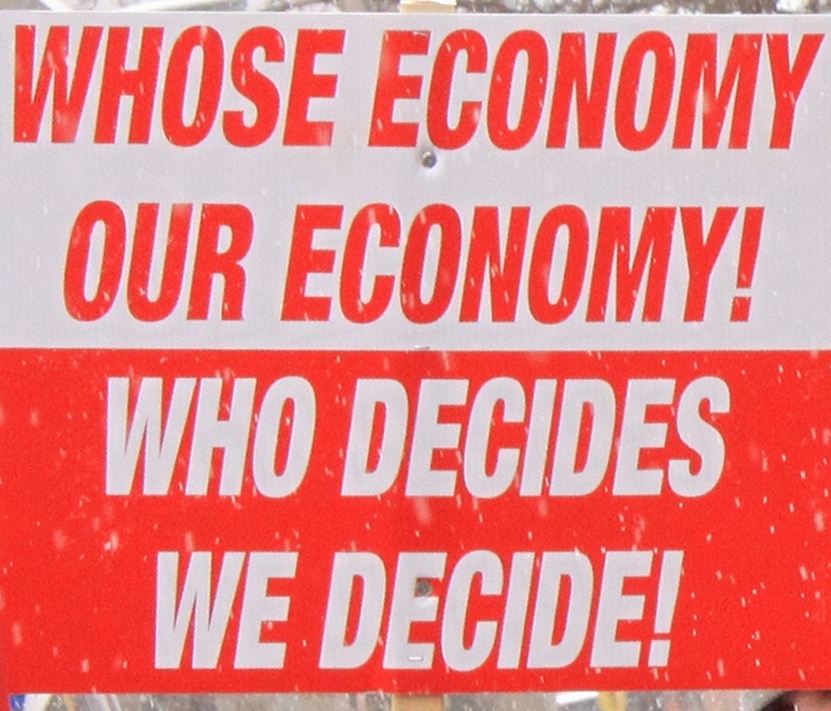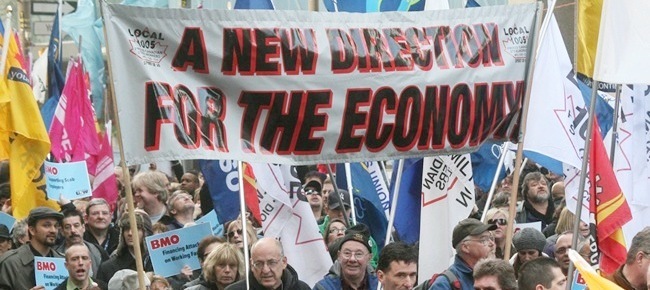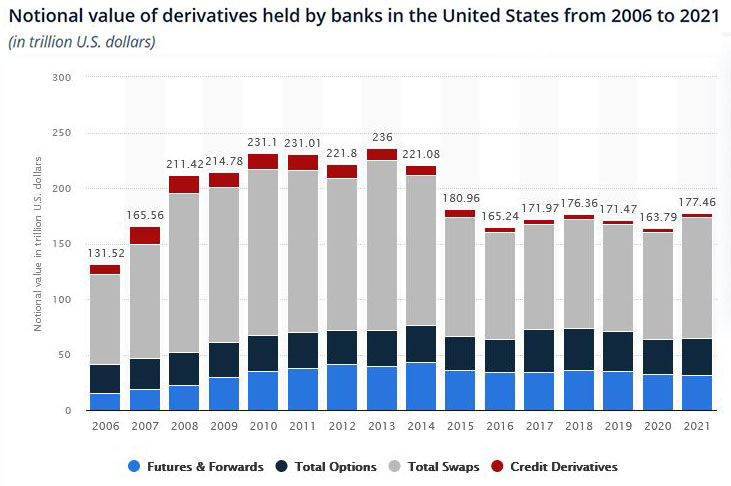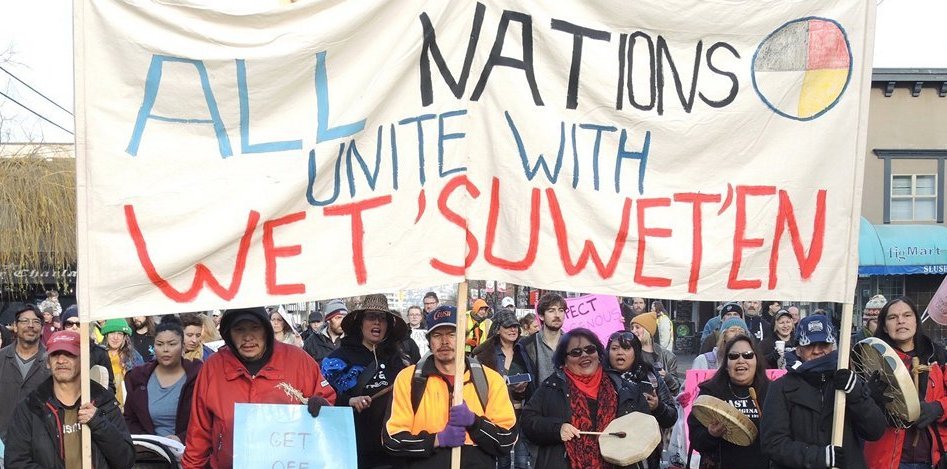No. 3
March 2023
Federal Budget 2023
• Only the People Can Provide Solutions to the Problems They Face
• Further Integration into Escalating U.S. Warmongering
• Economic Crisis Gathering Steam
U.S. War President Not Welcome in Canada
• Claiming High Ideals to Hide U.S. Demands that Canada Submit to Its Agenda for World Domination
• Militant Actions Declare "No to U.S.-Led Aggression and War -- Biden Go Home!"
• Canada's Follow-Through on Commitments
to U.S. at North American
Leaders' Summit
•
U.S. Operations in Canadian Arctic
Consolidated
During Biden's
Visit
Urgent Need to Defend the Rights of Migrants and Refugees
• Montreal Protest Against Canada-U.S. Decision to Further Block "Irregular Migration"
• Canadian Union of Public Employees Condemns Roxham Road Border Closure
• Facts About "Irregular Migration" in Context
Royal Canadian Mounted Police Out of Wet'suwet'en Land!
• Oppose State Violence Against
Wet'suwet'en in the Service
of Private
Interests
• Statement by Union of BC Indian Chiefs
• Visit of United Nations Special
Rapporteur on Rights
of Indigenous
Peoples
Federal Budget 2023
Only the People Can Provide Solutions to
the
Problems They Face

The Trudeau government's 2023 federal budget, issued March 28 by Finance Minister Chrystia Freeland, reflects a refusal of governments to address problems as they exist. Instead, the government is handing out money to powerful private interests and throwing dust in people's faces with cash payments.
The federal budget proves once again that private interests have seized control of governments and now plunder the public treasury at will to finance their projects and fatten their pockets.
Government budgets throughout the country have adopted the habit of providing stipends to individuals as payment towards the difficulties they face rather than dealing with the problems through increased investments in social programs. The Ontario government gave a small amount to families with students during the pandemic under the hoax of helping with the problems of Internet education. The Quebec government is providing an income tax deduction of about $300 to those with average taxable incomes. Now the federal government has unfurled a "grocery rebate" as a one-time hike to this year's GST rebate of $467 for families, $234 for singles and up to $255 for seniors.
The additional GST rebate does nothing to solve the problem of price inflation of groceries or any other necessary goods. As one woman said on CBC: "My husband and I are low income workers with two children. The prices of food and just about everything else we need to live are going up, making life very difficult. The grocery rebate amounts to less than two weeks groceries for our family. What are we to do for the rest of the year?"
The individual stipends are government admissions that they have no solutions to the problems the people, economy and society face. Governments are unwilling to strike out in a new direction that challenges global private interests because those private interests have seized control of governments.
The proof of the capture of governments by private interests is shown concretely in the most important feature of the federal budget -- $80 billion in handouts to big business and their private enterprises to invest as they see fit in "low-carbon electricity, manufacturing, and other elements of a clean economy." The amount for private business from the federal public purse, totalling up to 40 per cent of federal government spending, will be theirs to do with as they wish. In the words of the budget, the handouts will "remain in the market" for business to decide. Not a week goes by without government officials somewhere in the country announcing a handout to private business in one form or another.
The federal
budget proves once again that the people cannot rely on
the gods of plague to implement solutions to the problems the people,
economy and society face. The people are coming to realize that no
gains can be made without bravely and firmly opposing the global
private interests now in
control and striking out on their own. The ruling elite refuse to face
up to the social, economic and political problems or even think about a
new path because doing so would infringe on their monopoly right to
serve their narrow private interests above all else. They are captive
within those
private interests and cannot break free from their narrow aim, thinking
and outlook.
Solutions can be found in organizing the people in defence of the rights of all, for a pro-social direction for the economy and democratic renewal of political affairs.
The way forward is for working people to discover, in their organized actions with analysis, the ability to claim what belongs to them by right. They are the producers of all that they and society need for their existence.
The key is to shake off reliance on the ruling elite and their official institutions and the outmoded belief that they will do things in the people's favour. They will never do so! The people must be in charge of all matters that affect their lives. All out for a new direction! It can be done! It must be done!
Whose Economy? The People's Economy!
Who
Decides? The People Decide!
Under Whose Control? Under the People's Control!
Further Integration into Escalating U.S. Warmongering
The use of the term "Made-in-Canada" to describe the 2023 federal budget will have raised many eyebrows in the sense of why would it not be "made in Canada"? The term is clearly used to hide something, which is the true nature of the plans of Canada's ruling elite for nation-wrecking and further integration into the U.S. war economy.
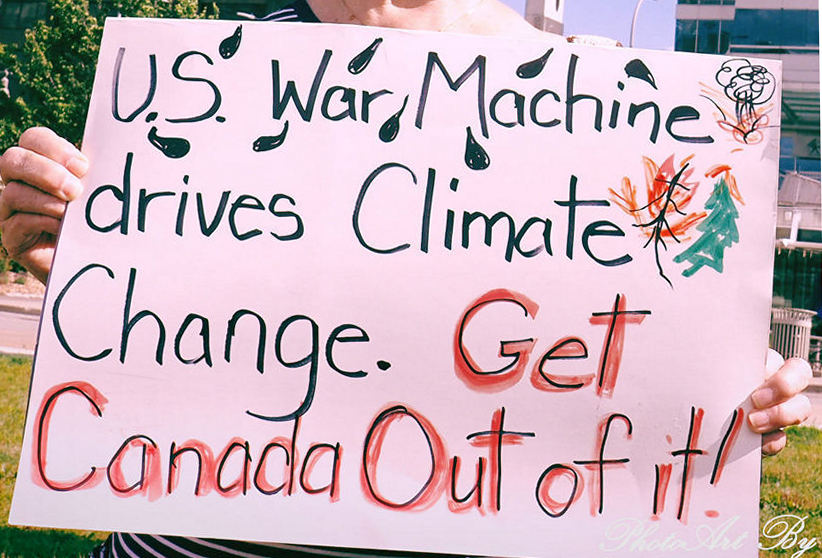 The
falsehood is seen in the analogy given in the chapter of the budget
dealing with the "Made-in-Canada Plan" which compares Canada's
integration into U.S. energy and critical minerals security with the
Transcontinental Railway on which Canada was built. "With the race to
build the global clean
economy already underway," the budget documents say, there is "a new
national project in front of us: to build our generation's version of
the Transcontinental Railway -- one that will protect our environment,
grow our economy, and ensure every single Canadian can share in the
prosperity we
will create together."
The
falsehood is seen in the analogy given in the chapter of the budget
dealing with the "Made-in-Canada Plan" which compares Canada's
integration into U.S. energy and critical minerals security with the
Transcontinental Railway on which Canada was built. "With the race to
build the global clean
economy already underway," the budget documents say, there is "a new
national project in front of us: to build our generation's version of
the Transcontinental Railway -- one that will protect our environment,
grow our economy, and ensure every single Canadian can share in the
prosperity we
will create together."
The "new national project" is based on, and in response to, the U.S. strategic plans announced in August 2022 with the Inflation Reduction Act which actually called for Canada to consolidate its status as a secure backyard of the U.S. as part of the attempt by the U.S. to shift away from dependency on China for critical minerals. With this budget, Canada announces that it will provide private businesses $80 billion in tax breaks and other measures to meet Canada's obligation towards this U.S. plan.
Canada's role in this is "to become a clean electricity superpower with a cross-Canada electricity grid that is more sustainable, more secure, and more affordable." It is also to provide the critical minerals: "From the resource workers that mine critical minerals or provide clean energy to the world, to the engineers designing next generation batteries, to the autoworkers assembling the electric vehicles people want to buy, we can ensure that Canadians produce the goods and resources that Canada and our allies will need for generations to come."
This orientation of the budget is brought out with specific reference to the U.S. demand for "friendshoring," which is part of the response of the U.S. to the crisis the "rules-based international order" is facing at home and abroad. The way out is to divide the world between "those who are with us and those who are against us" and target with aggression and sanctions countries that do not submit to U.S. hegemony, making Canada part of a very dangerous escalation of warmongering. The budget considers that this "represents a significant economic opportunity for Canada and Canadian workers" as "Canada can reap the benefits of becoming a reliable supplier of critical goods for our democratic allies."
This is anything but a nation-building project for Canada. It challenges the Canadian and U.S. working class movements to oppose the U.S. war machine and, in Canada, to oppose our integration into that war machine in the name of high ideals. Pierre Chénier, Secretary of the Workers' Centre of CPC(M-L), in an interview with Empower Yourself Now on the challenges facing Canadian workers at this time, pointed out: "In the name of good unionized jobs and a green economy, Canadian workers are being told to support the plans of the Biden Administration in the U.S. the Trudeau government has endorsed and is pushing in lockstep with the intelligence agencies which are promoting the plans of the Pentagon to target China. According to them, China and Russia are the enemies and Canada is safe within the U.S./NATO/NORAD equation.
"Canadians want Canada to be a Zone for Peace. They want Canada to uphold international rule of law, not the U.S. rules-based order whereby crimes can be committed against humanity in the name of high ideals," he said.
Pierre gave the example of the chauvinist stands being pushed onto Canadian industrial workers, miners, railway and transportation workers amongst others. He said:
"On March 28, in anticipation of the federal budget and its subsidies to the rich in the name of green jobs and green transition, the National Leader of the United Steelworkers said something outrageous which all workers should reject because it is not a way forward for either U.S. workers or Canadian workers. In a union press release, the USW President said:
"With his Inflation Reduction Act (IRA), President Biden committed hundreds of billions of dollars to fight climate change, invest in infrastructure and explicitly create good unionized jobs. The President knows that Canadian workers and the products we mine and manufacture are critical to making sure he meets his climate and economic goals. The Prime Minister and members of his cabinet have told workers they understand that too. This budget is their chance to deliver."
The press release added, "Along with Canadian aluminum, steel, cement and wood, critical minerals such as nickel, steel-making coal, cobalt, copper, lithium, indium and tellurium are mined and produced in Canada -- with far-lower carbon impacts and by workers often supported by good unionized jobs.
"In addition to calling for improved access to employment insurance and investments to expand health care -- including dental and pharma care, [the USW President] noted that investments in a sustainable jobs plan and a commitment to showcasing Canada's lower-carbon products are crucial, if the government is serious about supporting Canadian workers and earning more exemptions to the U.S. 'Buy America' rules."
The USW President continued: "From promising anti-scab legislation to investing in so-called 'just transition' this government has done a lot of talking about supporting Canadian workers, but President Biden has shown us what real action looks like.
"To make sure that high-quality, family-supporting unionized jobs stay in Canada and that both our countries meet our goals of a lower-carbon economy, workers need the Canadian government to take this chance to earn our continued place as a partner in President Biden's plans." (Emphasis added.)
Pierre also pointed out what the president of Unifor said when she went to speak at the United Auto Workers convention in the U.S. on March 27:
"Just last week I attended an official dinner, welcoming your President, Joe Biden, to Canada. Well me and a few hundred other Canadians.
"President Biden not only brought a message of shared opportunity and unity, he brought a message of solidarity. I don't think the word 'union' was mentioned so many times, in such a positive light, in the history of our House of Commons. It filled me with pride....
"I will say that, from our vantage point, what the U.S. is doing -- and the Biden Administration specifically -- on economic and industrial policy, is quite impressive. I've not seen this level of ambition to on-shore critical manufactured goods, invest in domestic value chains and promote clean tech – from any government, in my lifetime.
"If this is the economic race the U.S. has started, it's a damn good one. And it's one that Canada and the U.S., like most things, will win as running mates. A race that will be won by securing good jobs, with collective agreements, for all. [Emphasis added.]
"A race that will be defined by its worker-centred policies on EV consumer rebates.
"Our members were incredibly relieved to see that the Inflation Reduction Act set a special carve-in for Canada," she said. (Emphasis added.)
Pierre condemned this extolling of Canada as "a partner in President Biden's plans," Canada seeking "to be carved in" the Inflation Reduction Act, "Canada as a running mate" of the U.S. in its "damn good" "economic race."
"Here is a challenge to workers," Pierre said. "A challenge to refute that spirit of appeasement of the U.S. which is not resolving the all-sided crisis in which it is mired, which is deepening by leaps and bounds, and to step up their fight for an economy that serves the needs of the people and is controlled by the people and that contributes to cooperation among the people of the country and abroad.
"The threat is obvious in those speeches because workers are being told that if Canada is not a partner in Biden's plans, their jobs and also their unions are finished. Why not discuss what is happening to unions, jobs and the workers under those plans and how to be effective in providing the problems we face in Canada and what the workers in the U.S., Britain, France, Greece and other countries are facing as a result of the neo-liberal anti-social offensive and the anarchy and violence which prevail as a result of the clash between Authority and Conditions?
"Only the workers themselves should be permitted to speak in their name," Pierre concluded.
Budget Increases Police Funding to Interfere in Affairs of Canadian Polity and Internal Affairs of Other Countries
The Liberal government's 2023 budget states amongst other things that the government will take "decisive action to defend Canada and our public institutions from foreign threats and interference." It announces plans to spend an additional $65 million for purportedly "protecting diaspora communities and all Canadians from foreign interference, threats, and covert activities."
The RCMP will receive $48.9 million over three years "to protect Canadians from harassment and intimidation, increase its investigative capacity, [and] more proactively engage with communities at greater risk of being targeted." This is strange indeed since at present, reports indicate that it is the police prejudices which are causing "diaspora communities" to be harassed.
A National Counter-Foreign Interference Office is also to be established with an ongoing annual allocation of $3.1 million and a five-year start up fund of $13.5 million.
According to the message conveyed in the budget: "As an advanced economy and a free and diverse democracy, Canada's strengths also make us a target for hostile states seeking to acquire information and technology, intelligence, and influence to advance their own interests. This can include foreign actors working to steal information from Canadian companies to benefit their domestic industries, hostile proxies intimidating diaspora communities in Canada because of their beliefs and values, or intelligence officers seeking to infiltrate Canada's public and research institutions.
"Authoritarian regimes, such as Russia, China, and Iran, believe they can act with impunity and meddle in the affairs of democracies -- and democracies must act to defend ourselves. No one in Canada should ever be threatened by foreign actors, and Canadian businesses and Canada's public institutions must be free of foreign interference."
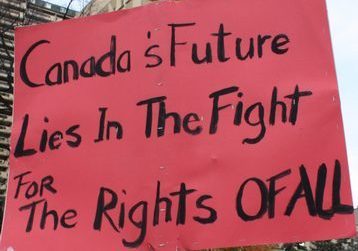
Describing Canada's electoral and political process as a "diverse democracy" introduces a new epithet reflecting the racist British colonial outlook embedded in the Canadian ruling elite's consciousness. It is no accident that it coincides with the persona the new King of Canada is trying to give himself with his claim that he will espouse the values of all the diverse religions and people who make up his British Isles as well as his supposed empire.
Referring to members of the Canadian polity, both born citizens and naturalized, as "diaspora communities" and turning that into a descriptor for "democracy" is to mix up and confounds matters that pertain to an individual's national heritage with matters that pertain to the rights of citizenship and participation in electoral and political affairs. All citizens, regardless of their national origin, stand as equal within a polity worthy of calling itself a democracy. This is not the case in Canada where the Constitution established a structure designed to be unequal, based on a class of rulers and an underclass of those who are ruled where the rulers are granted power and privileges and the people are deprived of decision-making power.
Economic Crisis Gathering Steam
In
her budget speech on March 28, Deputy Prime Minister and Finance
Minister Chrystia Freeland said, "Last year, Canada delivered the
strongest economic growth in the G7." She blamed "Putin and the
pandemic" which "drove up inflation around the world. Central banks
have responded with one of the fastest and most synchronized monetary
tightening cycles since the 1980s."
Her praise of
Canada's
strong economy verged on manic despite the fact that a serious economic
crisis has been gathering steam and what even business interests in
Canada say about the economy. Contrast Freeland's remarks to those of
the Business Council of British Columbia, among many who say
the same thing: "Canada's economy entered 2023 shouldering
serious structural weaknesses: the world's 4th most indebted advanced
economy; the highest private sector debt-servicing burden among G7
countries; the worst prospects in the OECD for growth in GDP per capita
and labour productivity over the next 40 years; business investment
that is barely keeping up with depreciation, resulting in a flat or
declining capital stock per worker; and a two-decade retreat from
international trade with exports shrinking as a share of GDP. Young
Canadians entering the workforce today face the unhappy prospect of the
lowest projected growth in average real incomes among the 38 OECD
countries over 2020-2060."
No mention in Freeland's
speech of the economic crisis which is gathering steam. The
immediate situation may
result in large-scale layoffs in the tech, health care and wine sectors
and the collapse of thousands of smaller companies in those sectors or
their seizure at little cost by the big cartels (hedge funds, tech,
health care and
food giants).
The crisis is similar in some respects to 2008 in that the same financial instruments play a role. There is massive lending (in this case not to home and car buyers but to start-ups that have little or no income for years and use constant borrowing to cover costs) and the parking of large amounts of deposits by the lenders (Silicon Valley Bank (SVB) and others) in bonds, in this case mostly government bonds, not the sub-prime mortgage-backed (junk) securities of 2008. However, the government bonds are sensitive to interest rates. Their value goes down below the original purchase price with every increase in the interest rate.
One article said that SVB, as a condition of lending, forced borrowers to hold all or most of their cash in the Silicon Valley Bank. Much of this cash would be the borrowed money that would then be used to pay employees etc at the borrowing start-ups to augment amounts (revenue) from operations (if any).
Almost all SVB deposits are above the $250,000 guaranteed limit of the Federal Deposit Insurance Corp. making that deposited cash unavailable unless the cash is withdrawn before the collapse. The Biden government has subsequently announced a public bailout of all SVB and the bankrupt Signature Bank depositors regardless of the size of the deposit.
Reports are circulating that suggest corruption occurred at SVB as certain insiders, including government officials, removed deposited cash and sold shares in SVB just prior to the collapse. Certain individuals (who have been named in social media) sold shares in SVB for millions of dollars just prior to the collapse. Anyone who bought those shares without inside knowledge of the bank's status or was holding other SVB shares when the bank collapsed will lose millions.
The immediate problem for SVB arose because the bank along with other financial institutions put much of their cash (deposits) into long-term government bonds at low interest rates. With price inflation and rising interest rates (determined by the Federal Reserve) those bonds have lost a lot of their value. This means that if the banks want to sell the bonds to raise cash they will lose a lot of their initial purchase amount. (The value of bonds goes in inverse relation to interest rates unless you hold them to maturity.)
SVB was forced to sell billions of dollars of its bonds at a loss because it no longer had enough money coming into its coffers to cover the withdrawals of their business customers for payrolls etc. This was compounded by new loans becoming fewer because of the higher interest rates and a downturn in the tech industry.
SVB and comparable banks rely on constant new demand for borrowing and then deposits of that borrowed money to cover drawings on its existing accounts but most importantly they require their accounts to appear positive and their share price to increase, and to guard against any run to withdraw deposits by worried depositors, which all sounds similar to a Ponzi scheme. (A Ponzi scheme requires a constant flow of new money coming in to service any money going out without any or little actual production of new value.)
A similar bank in New York (Signature) has also collapsed with the state governor saying all depositors, regardless of the size of the deposits, would be guaranteed. Reports say several other banks of much the same size are also on the verge of collapse.
Some reports suggest the problem may go beyond the smaller start-ups to involve the bigger tech companies such as Uber, Shopify, Doordash and AirBNB as most of them rely on constantly receiving new loans to cover their expanding businesses, which for the most part do not have positive cash flows.
"Shopify CEO made a comment on his own Twitter account saying there would be a 'minor impact' for the company. Tobi Lutke said a small portion of its U.S. operational fund flows were tied up in SVB, 'but we are working around it and it should be business as usual' -- with nothing directly addressing the impact on sellers."
However, Shopify clients are already sounding alarm bells saying their accounts, where customers' payments go through Shopify, have been disrupted.
"On Sunday evening, Lutke tweeted a copy of an email Shopify sent merchants, including offering assistance to those with SVB accounts who might have trouble meeting payroll."
Most commentators are eager to say that this crisis is different from 2008 because the bonds are government backed and not junk and that the only reason the bonds have lost value is because of higher interest rates. (Similar end result, however.) The only problem arises according to them from the fact that many of the start-ups (borrowers) are risky and have no positive income but most are not "junk." In a similar vein, it could be said that the subprime mortgage and car loan borrowers in 2008 were risky but that did not stop the banks from bundling the loans into huge bonds and selling them to companies.
The fact remains that deregulation allows a bank such as SVB and Signature to lend virtually an unlimited amount without any regard to how much it has in deposits or whether it can even service its existing depositors with cash when they need it. New loans were not coming in at the speed required so SVB was forced to sell-off many of its bonds at a huge loss. Depositors learned of the difficulties and began to withdraw their deposits en masse forcing SVB to close its doors.
SVB was the banking partner of almost half of the technology and health care companies listed in the U.S. in 2022.
Rising interest rates have left banks (and others) saddled with low-yielding bonds that cannot be sold quickly without a loss. (Those are government and mortgage-backed bonds bought when interest rates were near zero.) If too many customers withdraw their deposits simultaneously, a risk develops of a cycle being sparked because word soon spreads. This is compounded today by the fact that most depositors can move their money quickly using their smartphones.
SVB sold $21 billion of its bond portfolio before its collapse at a loss to gain some liquidity to service depositors who needed to withdraw money. SVB also announced plans to sell additional stock market shares compounding the suspicion that something was not right. Yet in the face of this, only two weeks before the collapse, U.S. banking regulators gave SVB a clean bill of health and ratings agencies continued to keep it at a very solid AA rating. People have now learned that the CEO of SVB began selling his stock weeks before the collapse.
SVB borrowers were also its main depositors. The borrowers, mostly tech and health care start-ups, now face higher interest rates plus a slowdown in the tech sector. (Meta/Facebook just announced layoffs of another 10,000 employees.) Start-ups require constant new borrowing to sustain their projects as income is slow to begin with and for many never reaches a level to sustain operations. With interest rates near zero this was sustainable for a time but as soon as interest rates rise many start-ups can no longer service their outstanding loans and do not qualify for new loans.
In this scenario, many borrowers began to withdraw their deposits at SVB just to keep their operations going. SVB did not have the cash on hand to give them their money thus forcing it to tap into its bond portfolio at a loss. (New bonds on the market now have higher interest rates, which drives down the value of the old outstanding bonds that have lower interest rates unless held to maturity.)
SVB, as is the case with all financial enterprises holding depositors' money, does not have anywhere near enough in available liquidity (cash and other holdings such as cashable bonds) to return all its deposits to depositors or even a fraction of deposits. As well, most of the depositors in SVB were tech companies with close connections to social media. Worry quickly spread and within days (by March 9) depositors withdrew $42 billion draining all of SVB's available reserves including its cashed-out bonds.
Banks overall in the U.S. are reported to have about $3 trillion in cash versus $17.6 trillion in deposits. But most of that cash is just a web page with an amount written on it. In fact, only about $100 billion (0.1 trillion) is held by banks in the form of physical notes in vaults and ATMs. Thus, the $17.6 trillion in deposits is supported by only $3 trillion in cash, of which perhaps $0.1 trillion is physical cash. The rest is backed by less liquid securities and loans as was the case with SVB.
Biden has moved to secure the current deposits in SVB via the Federal Deposit Insurance Corporation (FDIC) beyond the $250,000 upper limit. This means depositors will be able eventually to withdraw their money. Investors in SVB stock market shares stand to lose a lot. These include pension funds.
According to a March 13 news report, Swedish pension group Alecta faces losing as much as 12 billion Swedish kronor ($1.13 billion) following the collapse of Silicon Valley Bank. Alecta, which holds around SEK1.12 trillion in assets under management, was the fourth-largest shareholder in SVB Financial Group at the end of 2022 with a 4.45 per cent stake. The South Korea Pension Service, California Public Employees Retirement Fund and pension funds based in Rhode Island, Arizona, Colorado, Ohio, Sweden, the Netherlands and others will also lose money.
Trading of Derivatives
The trading of derivatives has become immense worldwide. Derivatives are paper holdings designating a payment for something at a rate derived from some feature of the thing, such as commodities (e.g., oil, gold), stocks, bonds, the weather, interest rates, currencies etc. -- in fact anything that a buyer and seller can agree on can be traded.
Derivatives also play a role in hedging against fluctuations in prices of things. A buyer needs to buy oil in six months so it buys an oil derivative at an agreed price and receives the oil in six months at that price regardless of any changes in the price of oil on the market.
Derivative trading is similar in many respects to the now common betting platforms on the Internet where you can place a bet on almost anything.
Derivative trading is the imperialist global market on steroids dominated by the big financial cartels (banks, hedge funds etc). The value of the derivatives held is immense as shown in the amounts held by U.S. banks in the chart below. As derivatives involve everything and anything, they are bigger in volume than any of the parts such as the stock markets. Derivatives can be traded through an exchange (e.g., Chicago Mercantile) or over-the-counter market between a party and counterparty.
(Statistica)
"The derivatives market is, in a word, gigantic -- often estimated at over $1 quadrillion on the high end. How can that be? Largely because there are numerous derivatives in existence, available on virtually every possible type of investment asset, including equities, commodities, bonds, and currency. Some market analysts even place the size of the market at more than 10 times that of the total world gross domestic product (GDP)," reports Investopedia.
Before Credit Suisse was taken over by UBS on March 19, it held trillions in derivatives and is known to have experienced losses in trades in recent years. Its possible collapse had been suspected for some time.
A trading website reported on March 15: "The cost of credit derivatives linked to Credit Suisse Group AG are blowing out to levels reminiscent of the financial panic of 2008 after the lender's biggest shareholder [Saudi National Bank] said it doesn't want to boost its stake. The moves are being exacerbated by banks rushing to buy protection against a possible default by the Zurich-based firm to reduce their counterparty risk on trades, according to people with knowledge of the matter. In a chaotic day of trading, quotes for one-year credit default swaps were considerably more expensive than the offers for longer durations as lenders tried to give themselves a near-term shield from their exposure to the lender, the people said."
A bankruptcy such as with SVB upsets the derivatives market because all its derivative contracts will collapse. Credit Suisse was a far larger cartel with a more global reach, one of 30 global financial institutions considered "systemically important financial institutions (SIFIs) too big to fail." Credit Suisse handled the trading accounts of several hedge fund cartels. Its ownership and control was global with the largest group holdings in the U.S., France and Saudi Arabia. The Saudi owners made it known they would not put any more money into Credit Suisse. (Some fallout also occurred because of the seizure and freezing in Switzerland of Russian-owned property resulting in recent declines of investment volumes in financial institutions headquartered in Switzerland.)
SVB held $27.7 billion in derivatives, no small sum, but it is only 0.05 per cent of the $55,387 billion ($55.387 trillion) held by JPMorgan, the largest U.S. derivatives bank or the amount held by Credit Suisse.
The derivatives market in Europe has an estimated amount of 660 trillion euros.
Government Bailouts
A few examples of the thousands of business depositors in Silicon Valley Bank the government has bailed out following the bank's collapse are noted below. As stated, the government is also bailing out depositors in the failed Signature bank. Six other banks are said to be "teetering" on the verge of collapse.
 Deposits
are insured up to $250,000 through insurance jointly paid by all banks
and administered by the FDIC. Deposits above that amount are not
insured unless the depositor buys private insurance, which most do not
do. The FDIC is acting as a receiver, which typically means it will
liquidate the
bank's assets to recoup some of the insured amounts it must pay out up
to $250,000. The FDIC does not have near enough funds in reserve to pay
any more than that amount.
Deposits
are insured up to $250,000 through insurance jointly paid by all banks
and administered by the FDIC. Deposits above that amount are not
insured unless the depositor buys private insurance, which most do not
do. The FDIC is acting as a receiver, which typically means it will
liquidate the
bank's assets to recoup some of the insured amounts it must pay out up
to $250,000. The FDIC does not have near enough funds in reserve to pay
any more than that amount.
A typical large depositor (and borrower) in SVB is Roku Inc. Roku, the maker of a streaming media player, said in a U.S. Securities and Exchange Commission filing that roughly $487 million or 26 per cent of its $1.9 billion in cash is deposited in SVB. Roku added that it believed it had enough cash for normal operations for the next twelve months as it has a remaining balance of $1.4 billion distributed across other large financial institutions.
The past year has been difficult for Roku, similar to many in the tech sector. Even though viewers (customers) have increased, revenue is stagnant as advertisers have decreased their spending. Roku also experienced declining device sales. The flat revenue compares with soaring expenses caused by price inflation and higher interest rates. According to Yahoo Finance, "[Roku] fourth-quarter operating expenses soared 71 per cent year over year, while revenues remained flat. Instead of the modest profit reported in 2021, operations lost a frightening $250 million in the fourth quarter. Over the past year, as revenues stagnated, the company reported a $498 million net loss. In November 2022, the company laid off around five per cent of its staff, but that might not be enough. The company forecast another net loss of $205 million in the first quarter of 2023."
A small sample of other companies with large deposits in SVB include Gaming platform Roblox; Circle, a blockchain-based payments company with $3.3 billion of its U.S. Dollar Coin cryptocurrency still held by SVB; and, iRhythm Technologies, which sells a wearable device that monitors cardiac patterns.
Reports say the U.S. Federal Reserve has established an emergency lending fund to backstop the bank bailouts. In the initial stage the fund will be large enough to bail out $175 billion in deposits. This backstop is similar to (but much smaller at this point) the bailouts in 2008/09. Many commentators believe the bank and other company bailouts by the government are a big factor in driving up the state debt and flooding the world with U.S. dollars contributing to the current price inflation.
The FDIC said it will auction off any assets of SVB and Signature Bank and possibly impose special assessments or tax on banks to recoup its losses if possible.
Parasitism and Decay on Full Display
During the pandemic economic slowdown U.S. banks have been piling excess cash into bonds resulting in a 44 per cent surge in their bond holdings to $5.5 trillion. Most of those bonds carry a low interest rate until maturity many years away. In 2022 the Fed began raising interest rates. New bonds now carry the higher interest rates. Most bonds are liquid in the sense they can be sold but the already bought bonds at lower interest rates will command a price much lower than the original price (to be paid at maturity) as the new buyer takes into account the loss in value because of price inflation, which is not covered by the bond's lower interest rate.
At the end of 2022, the U.S. FDIC reported unrealized losses on securities totalled $689.9 billion in the third quarter, up from $469.7 billion in the second quarter. These are paper losses that have not as yet turned into actual losses.
Unrealized losses on held-to-maturity securities (HTM bonds) totalled $368.5 billion in the third quarter, up from $241.8 billion in the second quarter. Unrealized losses on available-for-sale (AFS) securities totalled $321.5 billion in the third quarter, up from $227.9 billion in the second quarter. (Unrealized losses reflect the paper losses on securities the financial institutions are holding, which become realized when sold.)
The unrealized losses are important for lending institutions because they play a role in determining the amount they can lend according to how much money value they are holding (capital requirements).
To soften the blow of losses on their balance sheets banks can classify their security holdings as HTM or AFS. Those that are labelled HTM cannot be sold. But that means any changes in market value will not count in the formulas regulators use for calculating capital requirements. By contrast, any losses in the AFS basket have to be marked to market and deducted from the bank's capital (money value) base.
A huge paper loss is sitting on the balance sheets of U.S. banks. If they need money and sell their securities at a loss, this erodes their capital (money value) base restricting their capacity to lend.
The Financial Times (FT) warned only three months ago on December 27, 2022, "For now, U.S. banks remain awash in liquidity and are suffering no obvious financial stress. But rising deposit outflows and the increase in unrealized losses could become problematic if they need to sell investments to meet unexpected liquidity needs. Bond holdings could emerge as a serious pressure point for banks in volatile markets. Investors should watch out for this in 2023."
Two months later in 2023 the chair of the FDIC said: "The combination of a high level of longer-term asset maturities and a moderate decline in total deposits underscores the risk that these unrealized losses could become actual losses should banks need to sell securities to meet liquidity needs."
The stress and outflows started in earnest in early 2023 in the tech sector but had been building steam for some time. Investment activity in the tech sector fell significantly in the last quarter of 2021 and kept declining through 2022 and into this year.
The stress and outflow became evident in SVB's balance sheet. Panic began when SVB tried to raise money to cover its losses and this became common knowledge. The concern among deposit holders was made worse in early March when SVB announced it had lost $1.8 billion on asset sales during the attempt to raise money from selling securities.
FT asks rhetorically, "How could SVB have ended up in this exposed position? Why was it not stress-tested? Because in 2018 the regulations were changed and SVB was leading the charge pushing for the onerous regulations to be lifted.
"The bank executive lobbying in this instance is the same Greg Becker who sold $3.6 million of company stock under a trading plan less than two weeks before the firm disclosed extensive losses that led to its failure. The sale of 12,451 shares on February 27 was the first time in more than a year that Becker had sold shares in parent company SVB Financial Group, according to regulatory filings. He filed the plan that allowed him to sell the shares on January 26."
FT criticizes the Fed saying, "Look, you don't raise [interest] rates in record fashion on an economy toting record leverage at maximum speculation and expect no consequences. This [the collapse of SVB, Signature and quite possibly First Republic] was clearly going to happen, and now we're seeing the weak links in the chain break. The areas where speculation was most rampant and most egregious are clearly coming down. Years of excessive risk-taking are coming back to bite them hard. The situation will devolve very rapidly."
Economic Crisis Looms Large
Economic crises occur regularly under the imperialist system. The individual owners in control of the socialized economy and state politics are driven with the aim to expropriate as much social wealth as possible for themselves from what working people produce. This aim drives them to scour the earth in search of exploitable social wealth in ways that become riskier and more dangerous for the people and Mother Earth herself. Parasitism, war and decay pervade their system of control and narrow selfish aim. Given the global interrelatedness of the oligopolies which operate as cartels and coalitions, and extreme often violent competition among them, the crises have become increasingly dangerous and destructive.
The
people must take matters into their own hands and empower themselves
now to become those in control of the economic and political system and
all those affairs that affect their lives and Mother Earth. They must
create new forms of governance with a new direction and aim for the
economy to
humanize the social and natural environment within relations of peace
and cooperation for the benefit for all.
The narrow private interests which have created oligopolies which act as cartels and coalitions are leading society and Mother Earth to ruin. The peoples of the world are waging courageous battles to stop them, as in the case of the working class in France which is carrying out militant strikes against the police powers of the French presidency. It must be done! It can be done!
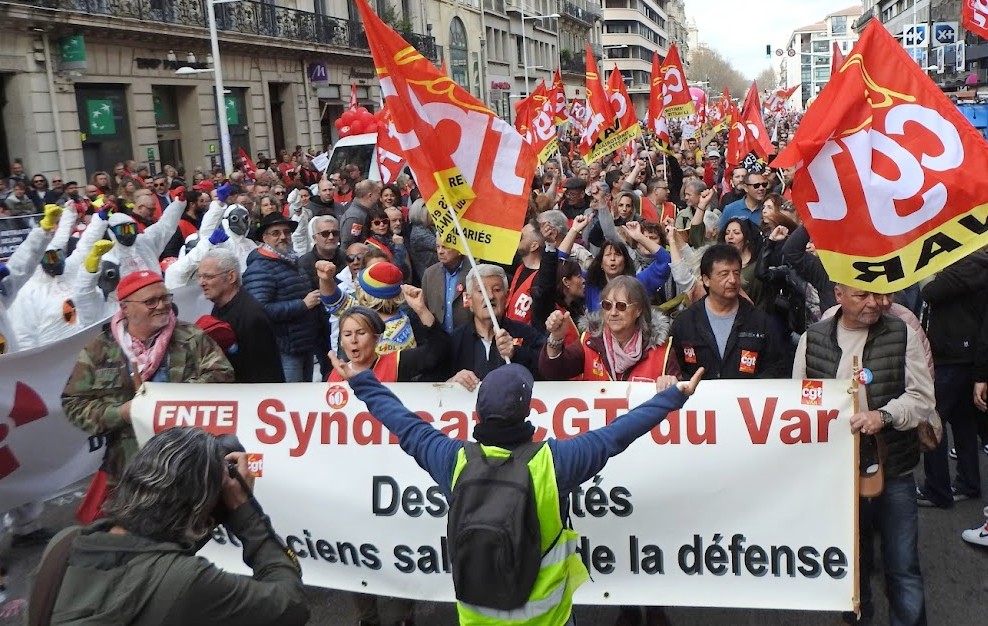
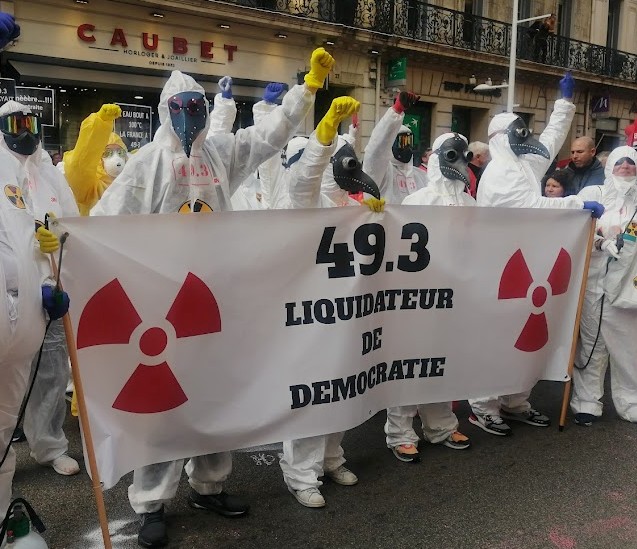
Toulouse,
France, March 23, 2023
Ellen Brown: "The Looming Quadrillion Dollar Derivatives Tsunami"
The following contains extensive excerpts from Ellen Brown's item, published March 12 following the collapse of the Silicon Valley Bank on March 10. TML comments are in double parentheses. The entire article is available here.
The FDIC fund is sufficient to cover only about two per cent of the $9.6 trillion in U.S. insured deposits. ((The FDIC fund insures bank deposits up to $250,000.)) A nationwide crisis triggering bank runs across the country, as happened in the early 1930s, would wipe out the fund. Today, some financial pundits are predicting a crisis of that magnitude in the quadrillion dollar-plus derivatives market, due to rapidly rising interest rates.
[...]
In 2002, mega-investor Warren Buffett wrote that derivatives were "financial weapons of mass destruction." At that time, their total "notional" value (the value of the underlying assets from which the "derivatives" were "derived") was estimated at $56 trillion. Investopedia reported in May 2022 that the derivatives bubble had reached an estimated $600 trillion according to the Bank for International Settlements (BIS), and that the total is often estimated at over $1 quadrillion. No one knows for sure, because most of the trades are done privately.
As of the third quarter of 2022, according to the "Quarterly Report on Bank Trading and Derivatives Activities" of the Office of the Comptroller of the Currency (the federal bank regulator), a total of 1,211 insured U.S. national and state commercial banks and savings associations held derivatives, but 88.6 per cent of these were concentrated in only four large banks: J.P. Morgan Chase ($54.3 trillion), Goldman Sachs ($51 trillion), Citibank ($46 trillion), Bank of America ($21.6 trillion), followed by Wells Fargo ($12.2 trillion). A full list is here [[https://www.usbanklocations.com/bank-rank/derivatives.html]]. Unlike in 2008-09, when the big derivative concerns were mortgage-backed securities and credit default swaps, today the largest and riskiest category is interest rate products.
[...]
In recent times [derivatives] have exploded into powerful vehicles for leveraged speculation (borrowing to gamble). In their basic form, derivatives are just bets — a giant casino in which players hedge against a variety of changes in market conditions (interest rates, exchange rates, defaults, etc.). They are sold as insurance against risk, which is passed off to the counterparty to the bet. But the risk is still there, and if the counterparty can't pay, both parties lose. In "systemically important" situations, the government winds up footing the bill.
Like at a race track, players can bet although they have no interest in the underlying asset (the horse). This has allowed derivative bets to grow to many times global GDP and has added another element of risk: if you don't own the barn on which you are betting, the temptation is there to burn down the barn to get the insurance. The financial entities taking these bets typically hedge by betting both ways, and they are highly interconnected. If counterparties don't get paid, they can't pay their own counterparties, and the whole system can go down very quickly, a systemic risk called "the domino effect."
That is why insolvent SIFIs had to be bailed out in the Global Financial Crisis (GFC) of 2007-09, first with $700 billion of taxpayer money and then by the Federal Reserve with "quantitative easing." ((Quantitative easing is a form of monetary policy used by central banks to increase the domestic money supply. A central bank, like the U.S. Federal Reserve, purchases securities from the open market to reduce interest rates and increase the money supply. Quantitative easing creates new bank reserves, providing banks with more liquidity and encouraging lending and investment. – Investopedia.))
Derivatives were at the heart of that crisis [2008]. Lehman Brothers was one of the derivative entities with bets across the system. So was insurance company AIG, which managed to survive due to a whopping $182 billion bailout from the U.S. Treasury; but Lehman was considered too weakly collateralized to salvage. It went down, and the Great Recession followed.
Derivatives are largely a creation of the "shadow banking" system, a group of financial intermediaries that facilitates the creation of credit globally but whose members are not subject to regulatory oversight. The shadow banking system also includes unregulated activities by regulated institutions. It includes the repo market, which evolved as a sort of pawn shop for large institutional investors with more than $250,000 to deposit. The repo market is a safe place for these lenders, including pension funds and the U.S. Treasury, to park their money and earn a bit of interest. But its safety is insured not by the FDIC but by sound collateral posted by the borrowers, preferably in the form of federal securities.
As explained by Prof. Gary Gorton:
This banking system (the "shadow" or "parallel" banking system) – repo based on securitization – is a genuine banking system, as large as the traditional, regulated banking system. It is of critical importance to the economy because it is the funding basis for the traditional banking system. Without it, traditional banks will not lend and credit, which is essential for job creation, will not be created.
While it is true that banks create the money they lend simply by writing loans into the accounts of their borrowers, they still need liquidity to clear withdrawals; and for that they largely rely on the repo market, which has a daily turnover just in the U.S. of over $1 trillion. British financial commentator Alasdair MacLeod observes that the derivatives market was built on cheap repo credit. But interest rates have shot up and credit is no longer cheap, even for financial institutions.
According to a December 2022 report by the BIS, $80 trillion in foreign exchange derivatives that are off-balance-sheet (documented only in the footnotes of bank reports) are about to reset (roll over at higher interest rates). Another time bomb in the news is Credit Suisse, a giant Swiss derivatives bank that was hit with an $88 billion run on its deposits by large institutional investors late in 2022. The bank was bailed out by the Swiss National Bank through swap lines with the U.S. Federal Reserve at 3.33 per cent interest.
[...]
The 2005 safe harbour amendment to the bankruptcy law says that the collateral posted by insolvent borrowers for both repo loans and derivatives has "safe harbour" status exempting it from recovery by the bankruptcy court. When Lehman appeared to be in trouble (2008), the repo and derivatives traders all rushed to claim the collateral before it ran out, and the court had no power to stop them.
[...]
The safe harbour exemption is a critical feature of the shadow banking system, one it needs to function. Like traditional banks, shadow banks create credit in the form of loans backed by "demandable debt" – short-term loans or deposits that can be recalled on demand. In the traditional banking system, the promise that the depositor can get his money back on demand is made credible by government-backed deposit insurance and access to central bank funding. The shadow banks needed their own variant of "demandable debt," and they got it through the privilege of "super-priority" in bankruptcy.
Safe harbour status grants the privilege of being excluded from mandatory stay, and basically all other restrictions. Safe harbour lenders, which at present include repos and derivative margins, can immediately repossess and resell pledged collateral. This gives repos and derivatives extraordinary super-priority over all other claims, including tax and wage claims, deposits, real secured credit and insurance claims.
The dilemma of our current banking system is that lenders won't advance the short-term liquidity needed to fund repo loans without an ironclad guarantee; but the guarantee that makes the lender's money safe makes the system itself very risky. When a debtor appears to be on shaky ground, there will be a predictable stampede by favoured creditors to grab the collateral, in a rush for the exits that can propel an otherwise-viable debtor into bankruptcy; and that is what happened to Lehman Brothers [2008 crisis].
Derivatives were granted "safe harbour" because allowing them to fail was also considered a systemic risk. It could trigger the "domino effect," taking the whole system down.
[...]
Interest rate derivatives are particularly vulnerable in today's high interest rate environment. From March 2022 to February 2023, the prime rate (the rate banks charge their best customers) shot up from 3.5 per cent to 7.75 per cent, a radical jump. Market analyst Stephanie Pomboy calls it an "interest rate shock." It won't really hit the market until variable-rate contracts reset, but $1 trillion in U.S. corporate contracts are due to reset this year, another trillion next year, and another trillion the year after that.
An interest rate shock to the massive derivatives market could take down the whole economy. Michael Snyder, in a 2013 article titled "A Chilling Warning About Interest Rate Derivatives," wrote, "Will rapidly rising interest rates rip through the U.S. financial system like a giant lawnmower blade? Yes, the U.S. economy survived much higher interest rates in the past, but at that time there were not hundreds of trillions of dollars worth of interest rate derivatives hanging over our financial system like a Sword of Damocles.
"Rising interest rates could burst the derivatives bubble and cause 'massive bankruptcies around the globe' [quoting Mexican billionaire Hugo Salinas Price]. If [the 'too big to fail' banks go bankrupt] ... our entire economy will go down with them. Our entire economic system is based on credit, and just like we saw back in 2008, if the big banks start failing, credit freezes up and suddenly nobody can get any money for anything. [...]"
((The remaining half of the Ellen Brown article contains her proposals to reform the banking system in a manner she says would benefit the people. In doing so she presents actions the people could take in the present to defend what belongs to them by right but then curiously uses those policy objectives to negate the necessity to create new forms which would resolve the crisis in their favour. The crisis arises out of a dysfunctional imperialist system and is not a matter of bad policies and behaviour as such. No matter how corrupt and morally reprehensible, they are par for the course and "good polices" are not favoured when the economy is reduced to a global casino in which things spiral from bad to worse.
The socialized economy has spread throughout the world with productive forces led by a modern working class but captured within relations of production under the control of supranational narrow private interests, a social class no longer relevant but hanging on through oppression, destruction and war. To establish their own vantage point, the workers must settle scores with the old conscience of society and fight for what belongs to them by right from that perspective.))
U.S. War President Not Welcome in Canada
Claiming High Ideals to Hide U.S. Demands that Canada Submit to Its Agenda for World Domination
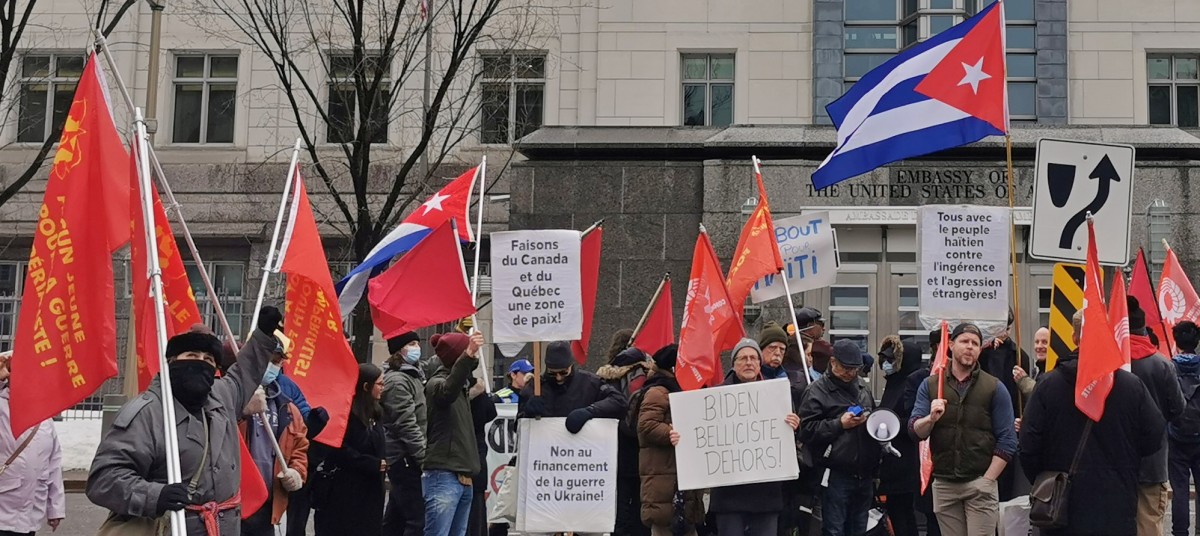
Ottawa, March 23, 2023
picket on first day of Biden visit -- Biden Not Welcome in Canada.
The dignity of the people of Canada and Quebec was upheld through actions held in Ottawa and in cities across the country that opposed U.S. President Joe Biden's first official visit to Canada on March 23-24.
During his visit Biden and his entourage attended a gala dinner and met privately with Governor General Mary Simon as well as with Prime Minister Trudeau and Senior Liberal Cabinet Ministers, and separately with Conservative Party leader Pierre Poilievre. Biden addressed the House of Commons on March 24.
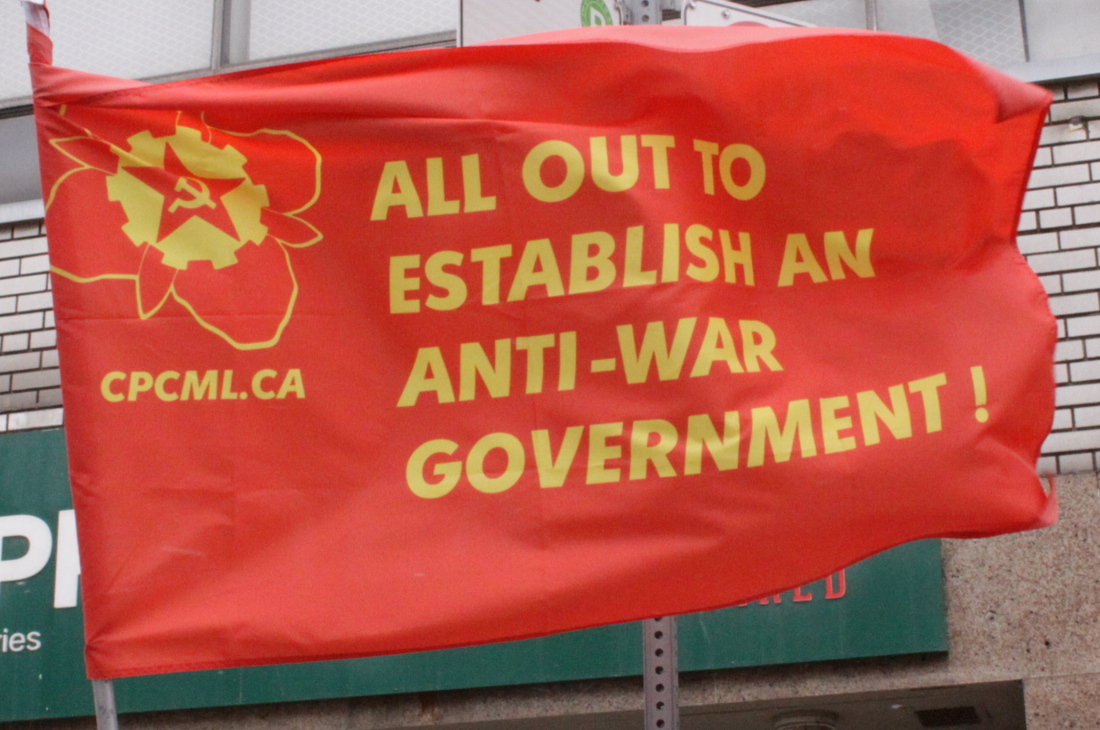
Quoting John F. Kennedy in his 1961 visit to Canada, Biden said, "Ours is the unity of equal and independent nations, co-tenants of the same continent, heirs of the same legacy, and fully sovereign associates in the same historic endeavour: to preserve freedom for ourselves and [for] all who wish it." This is the historic fraud meant to cover up all the crimes committed by the U.S. and its NATO allies and other "coalitions" against the striving of peoples and nations for their independence.
The "freedom" of "all who wish it" is equated with submission to U.S. dictate and those who resist will suffer the consequences -- U.S.-instigated coups d'état and acts of war including sanctions and military intervention. The Joint Statement issued by Trudeau and Biden on the occasion serves to confirm that Biden is a war president and Trudeau an appeaser of U.S. warmongering who does not represent Canadians and Quebeckers and their anti-war conscience.
For example, they claim, "Canada and the United States also remain concerned about deteriorating security in Haiti, committed to increasing international support for the Haitian people, including through security and humanitarian assistance, enhanced support for the Haitian National Police, and by holding accountable those who undermine Haiti's stability." The sordid history of interference in Haiti by the U.S., Canada, France and other countries is as well known as the Haitian people's refusal to kowtow to foreign domination. Such a statement can only be seen as criminals returning to the scene of the crime to "finish the job."
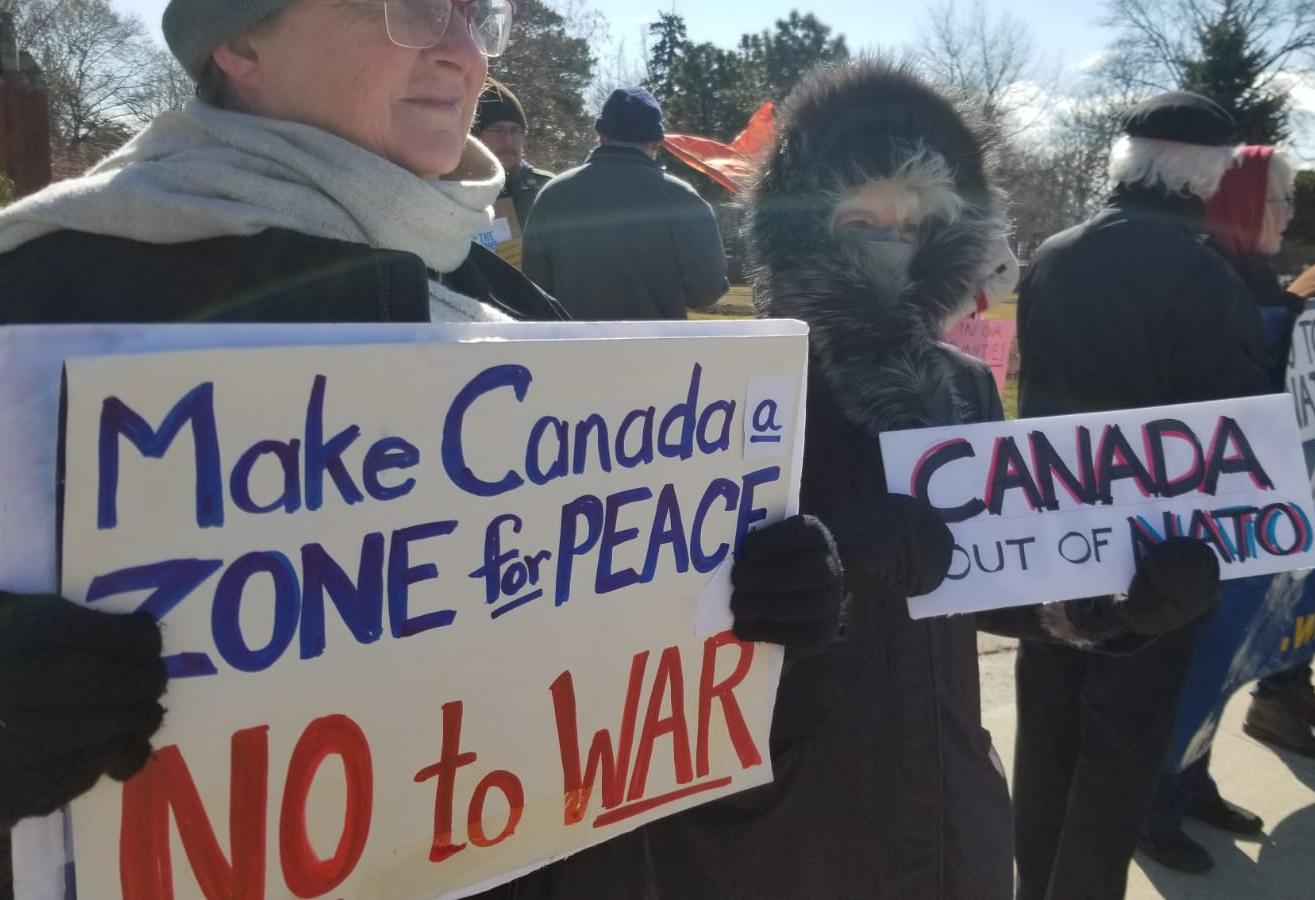
The one-year Energy Transformation Task Force announced in the Joint Statement is to give the U.S. access to Canada's critical minerals, and integrate energy systems in the name of collective energy security. The further militarization of the Arctic through expansion of NORAD is, as the Joint Statement says, "to ensure NORAD's ability to deter and defend against emerging threats to our air and sea space and compete with China and Russia for years to come."
The Joint Statement reflects both the demands of the U.S. on Canada and the Trudeau government's acquiescence and appeasement of the U.S. hegemonic aims and its willingness to comply and to trample on the rights of Canadians and Indigenous Peoples to have a say in the direction of the economy and Canada's foreign policy. The decisions outlined in the Joint Statement of Prime Minister Trudeau and President Biden were made well in advance of the visit, behind the backs of Canadians and without discussion in Parliament. In fact it was revealed that the decision to expand the Safe Third Country Agreement to allow authorities in both countries to apprehend and return asylum seekers at both official and unofficial border crossings had been made almost a year ago.
The Joint Statement outlines seven areas on which the U.S. and Canada will work together to:
- Catalyze Clean Energy and Create Good Jobs,
-
Strengthen Resilience of Critical Mineral and Semiconductor Supply
Chains,
- Protect Our Shared Waters and the Arctic,
-
Advance Diversity and Inclusion,
- Bolster Global Alliances,
-
Invest in our Collective Defence and Security, and
- Manage
Migration Collaboratively.
Biden's visit was used to escalate the warmongering talk against Russia and the "serious long-term challenge to the international order posed by the People's Republic of China," even as Canadian warships were preparing to deploy to the Asia-Pacific to enforce the unjust U.S.-engineered UN sanctions against the DPRK and meddle in the region.
The demand of the U.S. for the integration of Canada into the U.S. economy and for one integrated North American economy follows on the summit of the "three amigos," -- U.S. President Biden, Prime Minister Trudeau and Mexican President López Obrador -- in Mexico in January. Commenting on the summit, Mexico's Foreign Minister Marcelo Ebrard said that the 12-person joint trade committee struck will "have our complete confidence to motivate, persuade and convince business people, workers and public servants of the three governments about the importance ... of joining forces in North America and, moving forward, seeking the union of the entire American continent."
The fawning of politicians of the cartel parties and some union leaders over war president Biden's self-proclaimed support for workers and for good union jobs is shameful. It is fraud which can be seen in his government's criminalization of the struggle of railway workers for safe working conditions and the militant struggles of U.S. workers for their rights. Canadian workers have nothing to gain from following Biden's lead to a "green economy" based on exploitation of Canadian resources and labour to serve U.S. imperialist aims.
What the U.S. demands of Canada is nothing less than total integration into the U.S. economy, as a supplier of what is needed for its war machine and willing participant in the U.S. aim for world hegemony, targeting Russia and China and any country that refuses to submit. The Joint Statement is a declaration against the interest of the people of both countries and the world.
Militant Actions Declare "No to U.S.-Led Aggression and War -- Biden Go Home!"
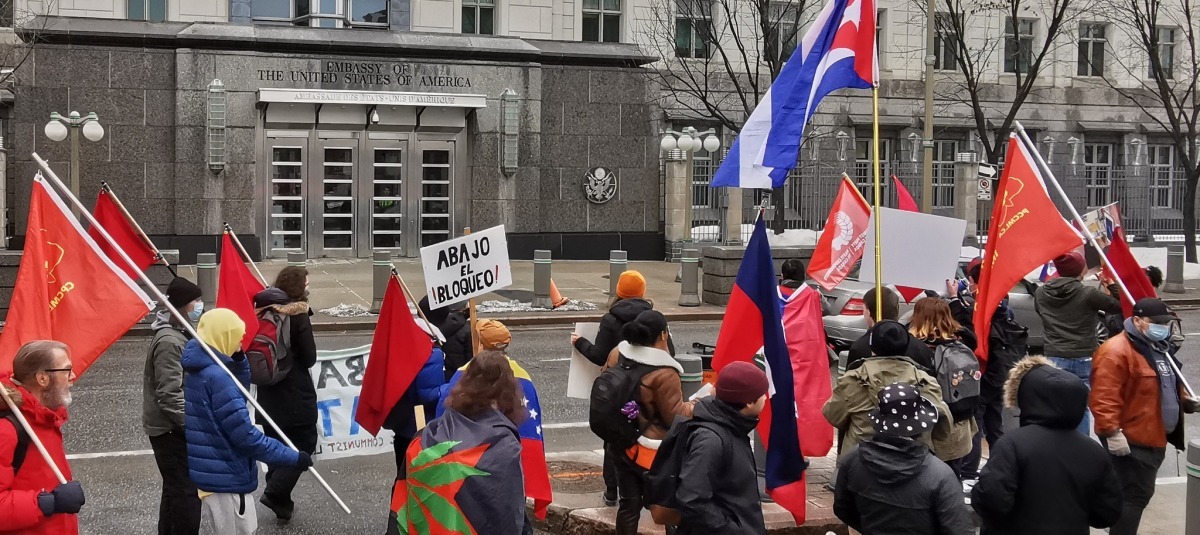
Demonstration at U.S.
Embassy in Ottawa, March 23, 2023
Visits like the official state visit of U.S. President Joe Biden and First Lady Dr. Jill Biden to Canada are invariably presented by the Canadian state and monopoly media as reinforcing friendship between the two countries. However, the record shows that such visits are always for purposes of imposing further integration of Canada into the U.S. economy and war machine. At a time when the U.S. is falling deeper into crisis at home, it is stepping up brinksmanship and war preparations abroad, and expects Canada to fall in line. However, Canadians and Quebeckers have a proud history of taking stands against imperialist aggression and war, and on this basis held demonstrations in several cities, to unequivocally tell Biden to go home.
Youth for Democratic Renewal, members of the Haitian
community,
activists from the Cuba solidarity movement from Ottawa, Gatineau and
Montreal along with CPC(M-L) activists converged outside the U.S.
Embassy in Ottawa on March 23 to send a clear message to Biden that he
is not welcome in Canada. Members of the Haitian community spoke
forcefully and proudly in defence of their homeland and against the
insidious plans of the two countries. So too did the friends and
supporters of Cuba call on Biden to immediately end the U.S. illegal
blockade of Cuba.
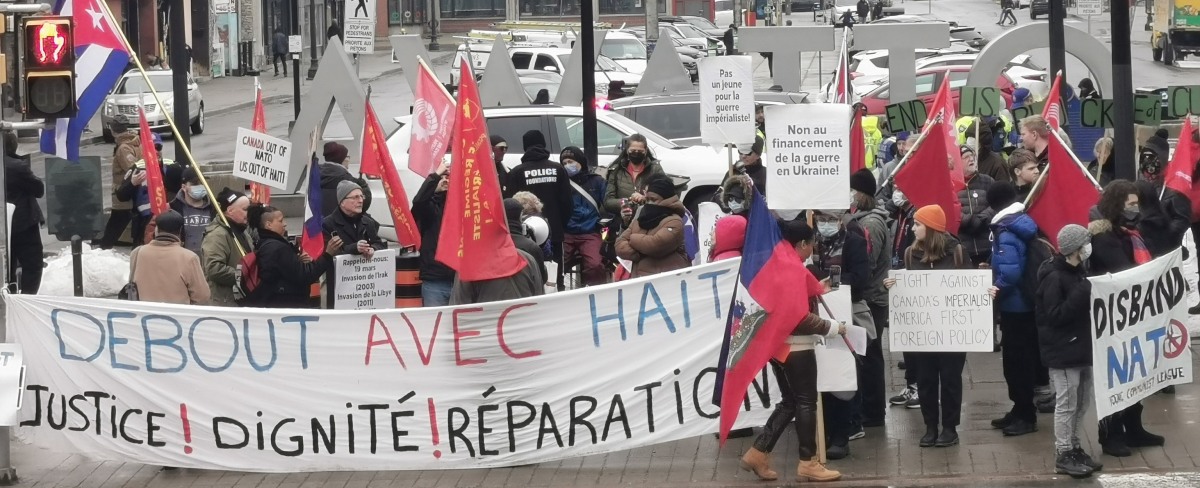
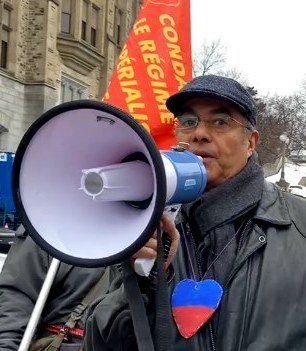
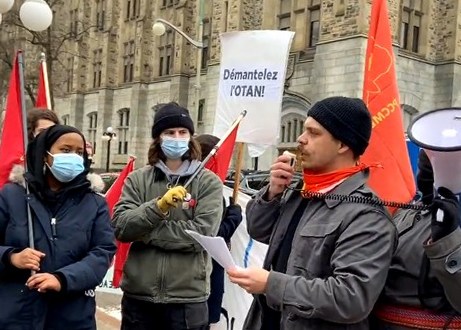
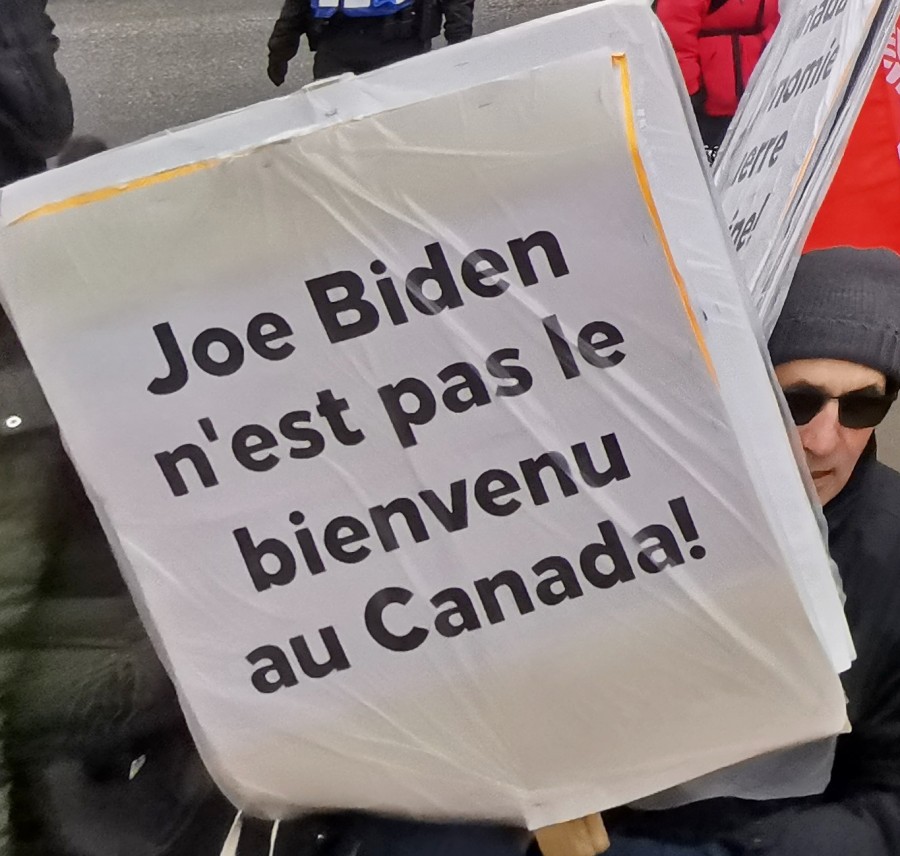
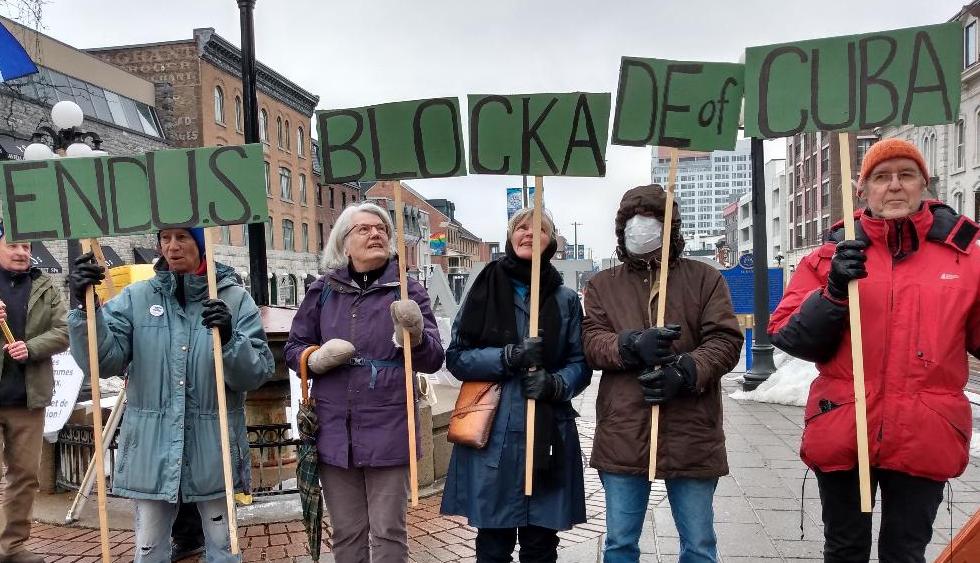
Ottawa,
March 23, 2023
In Montreal on March 24, at the call of the organization Solidarité Québec-Haïti, a vigorous rally was held for nearly two hours in front of the U.S. Consulate. Many held Haitian flags and signs that read: Stop Arming the Killers, Biden/Trudeau, Stop the Genocide, Stop Supporting Gangs in Haiti, United States, Core Group: Get Out of Haiti!, Haiti Will Not Die, Long Live the Haitian People's Struggle for Their Right to Be! and many other slogans that people chanted in unison. Passing cars honked in support.
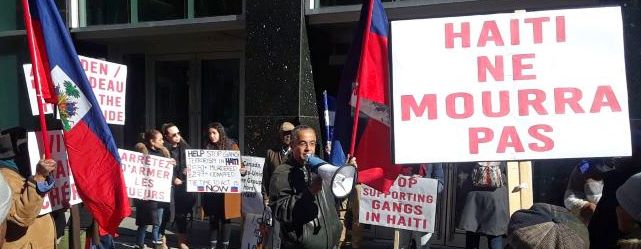

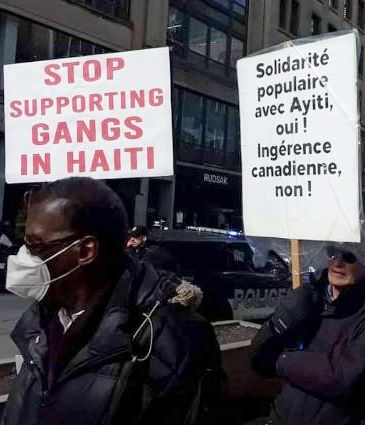
Montreal,
March 24, 2023
In Alberta, Calgarians and Edmontonians took their place with those across Canada saying No to Warmongering and Get Canada Out of NATO, with bold and spirited pickets during afternoon rush hour on March 23. Many people walking and driving gave a thumbs up or honked as they passed the picket. Others stopped to engage in discussion, especially on the role of NATO. Calgarians in particular are concerned that on the day Joe Biden arrived in Canada, Alberta's minister of Jobs and Economy Brian Jean, speaking at a Calgary Chamber of Commerce luncheon, offered up the city as the home to NATO's new Defence Innovation Accelerator for the North Atlantic (DIANA) offices in North America.

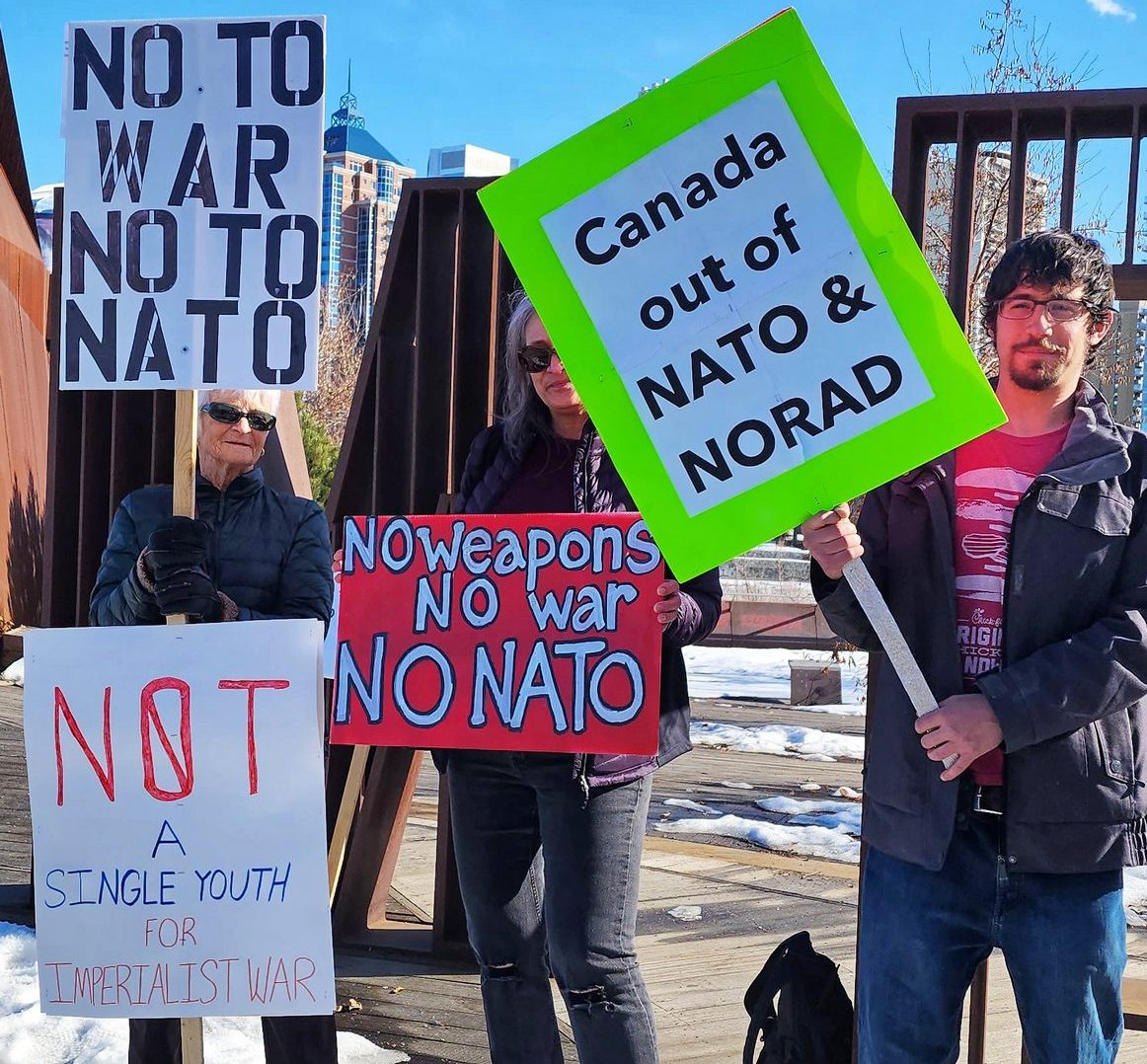
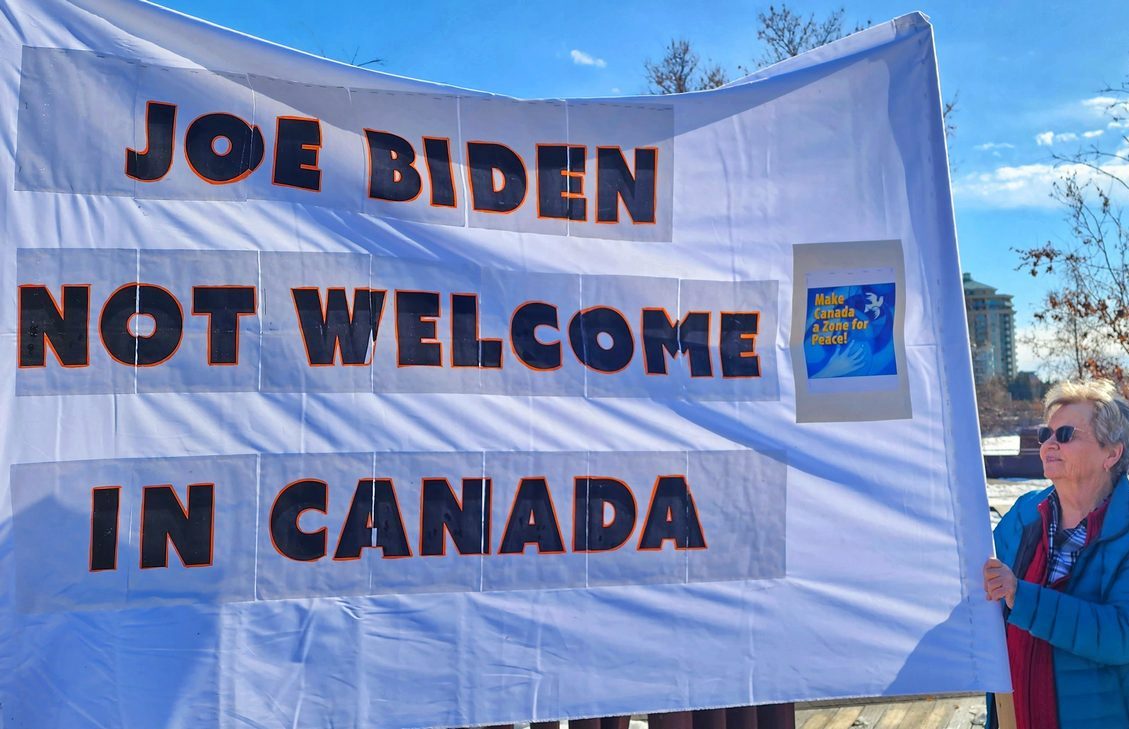 Calgary
Calgary
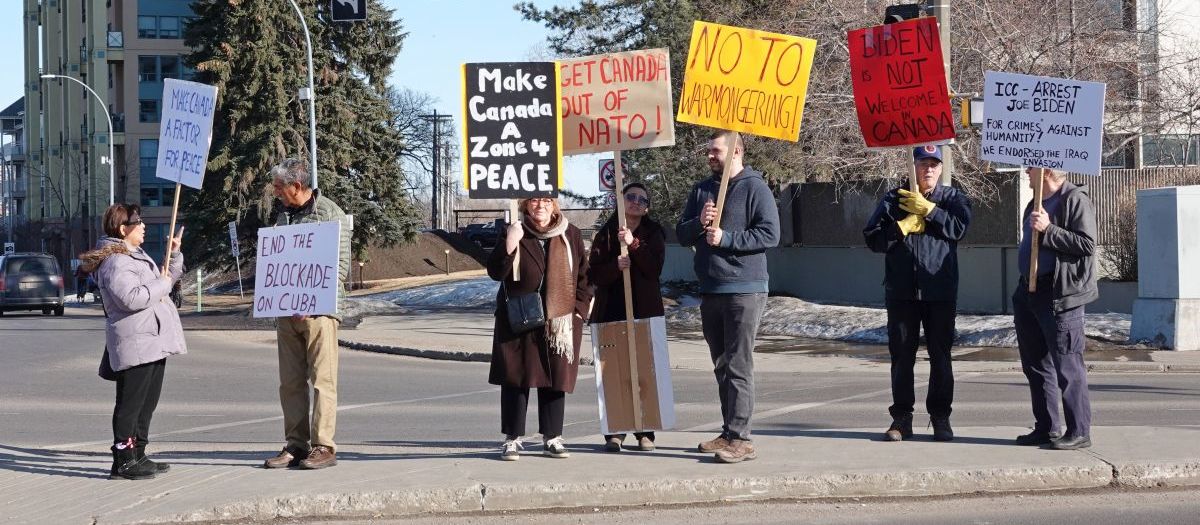
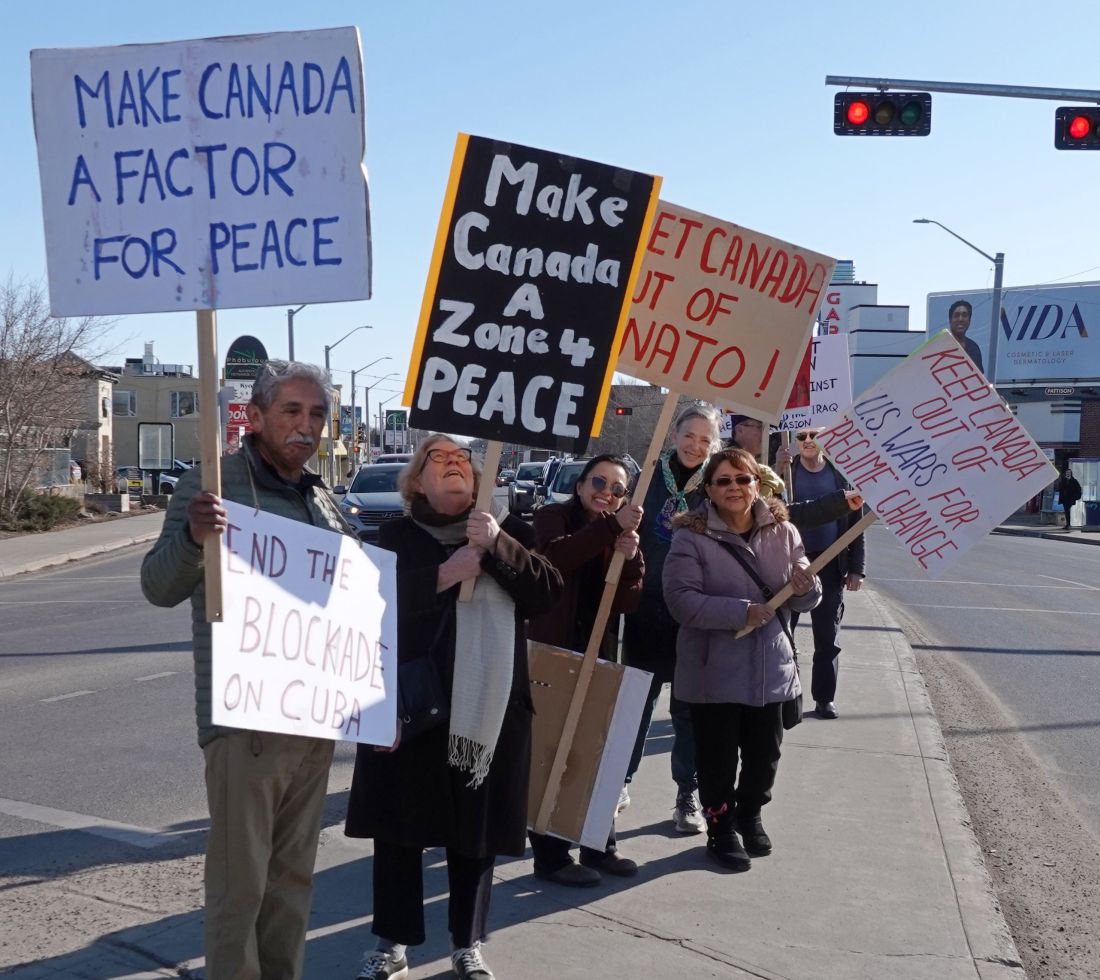
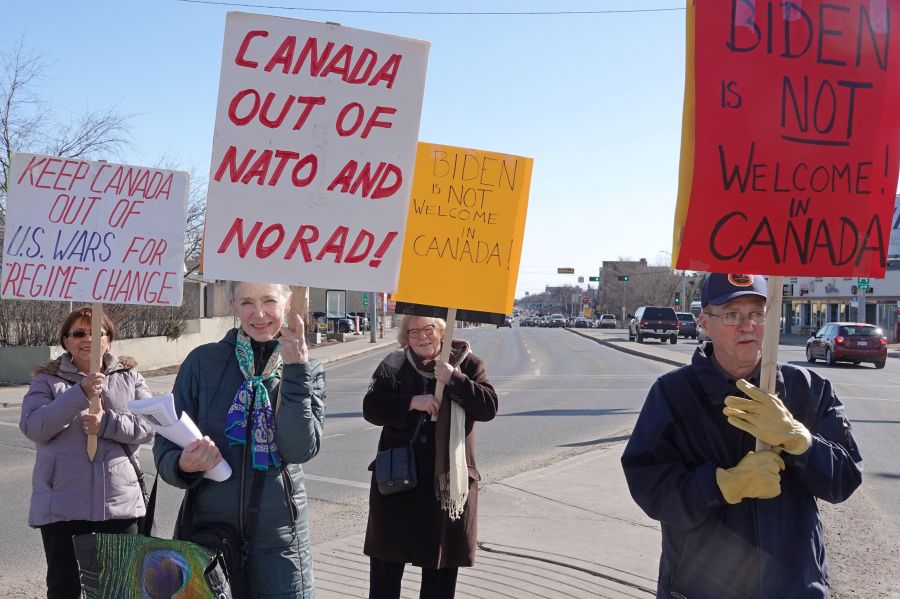
Edmonton
On March 19, actions were held in Montreal, Toronto and Windsor, to denounce Biden's forthcoming visit as well as to mark the 24th anniversary of NATO's war on Yugoslavia (March 24, 1999), the 20th anniversary of the U.S.-led war on Iraq, and the 12th anniversary of NATO's war on Libya and to hold the U.S. to account for these crimes.


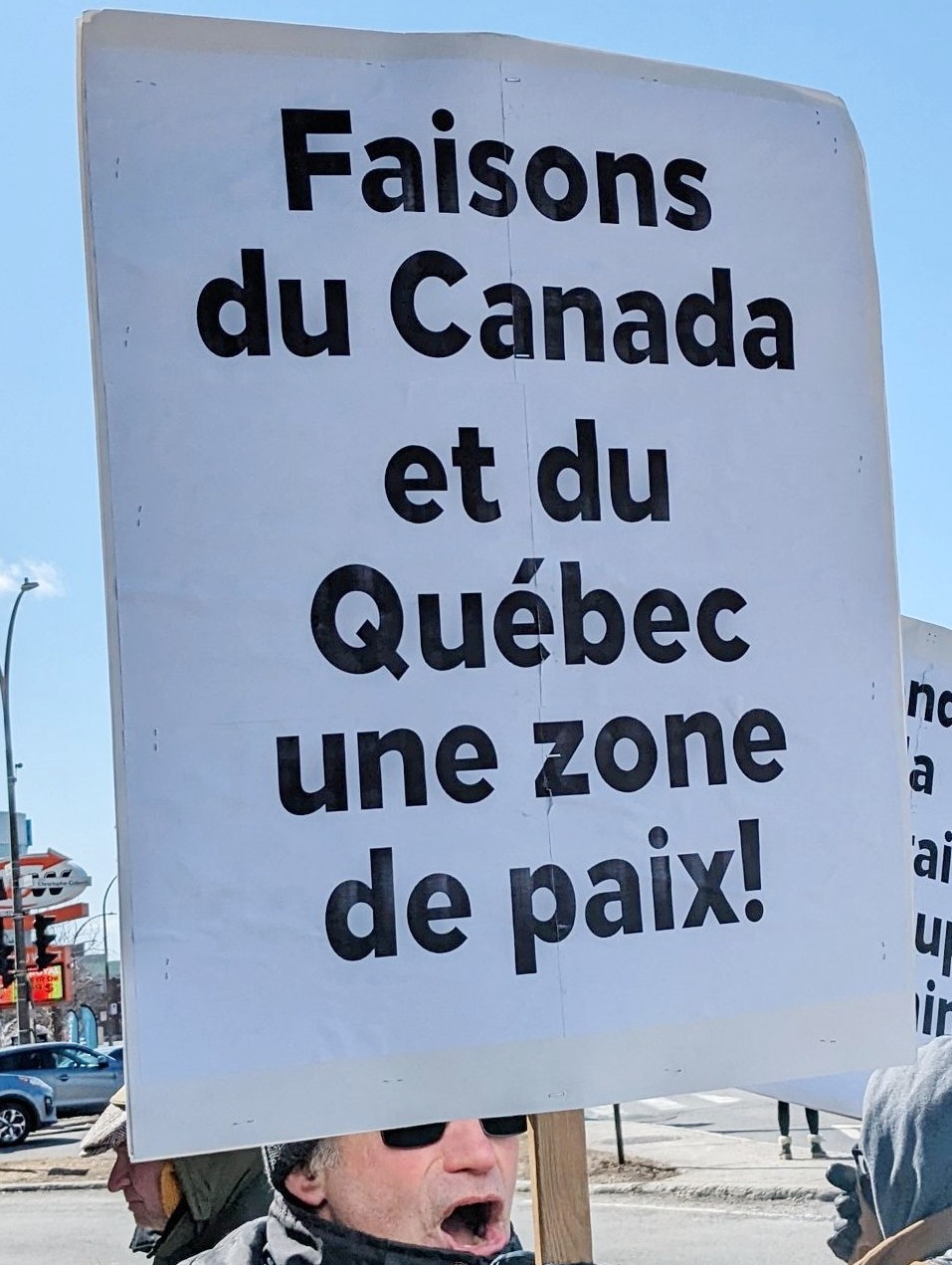
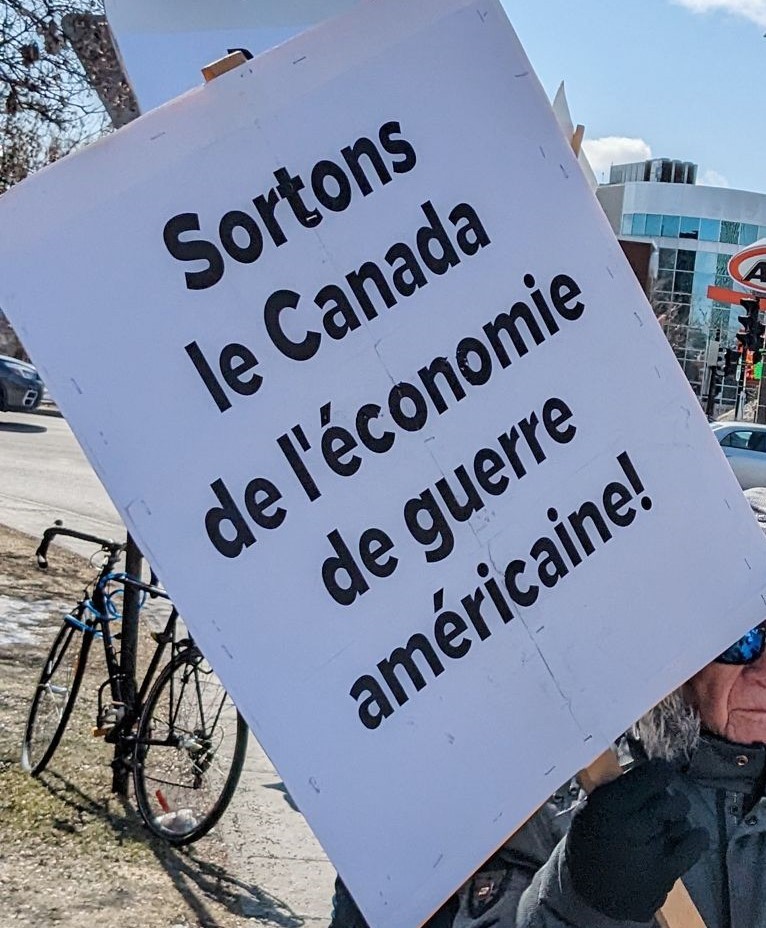
Montreal, March 19,
2023
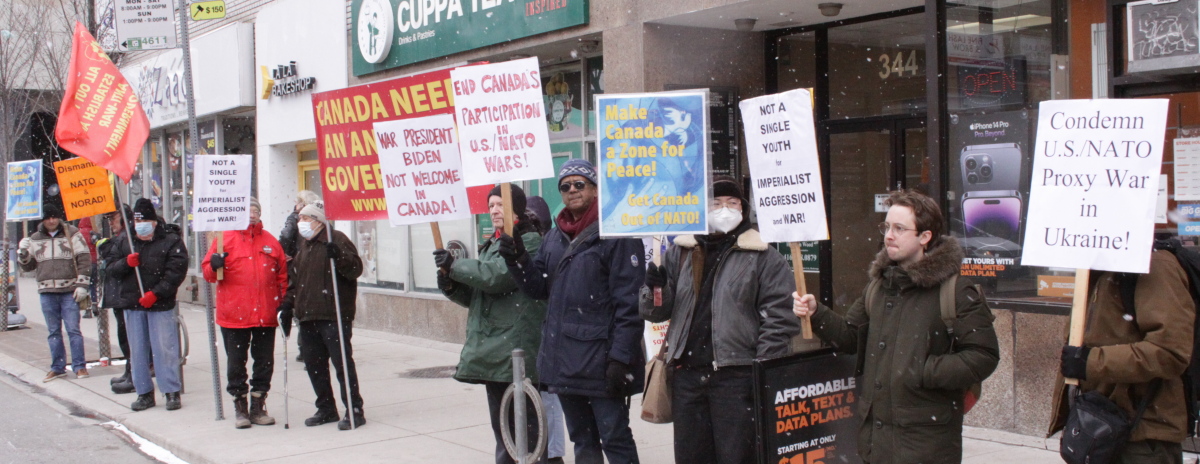
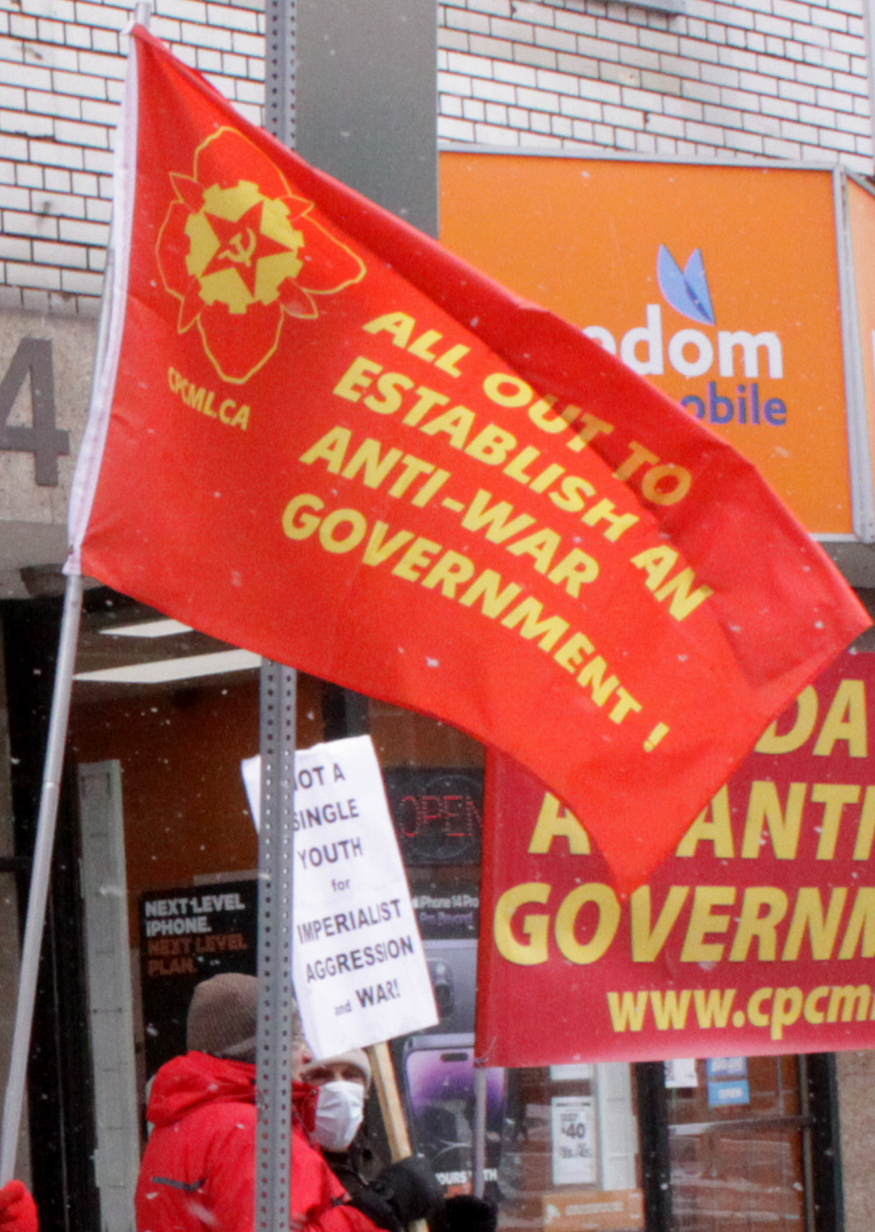
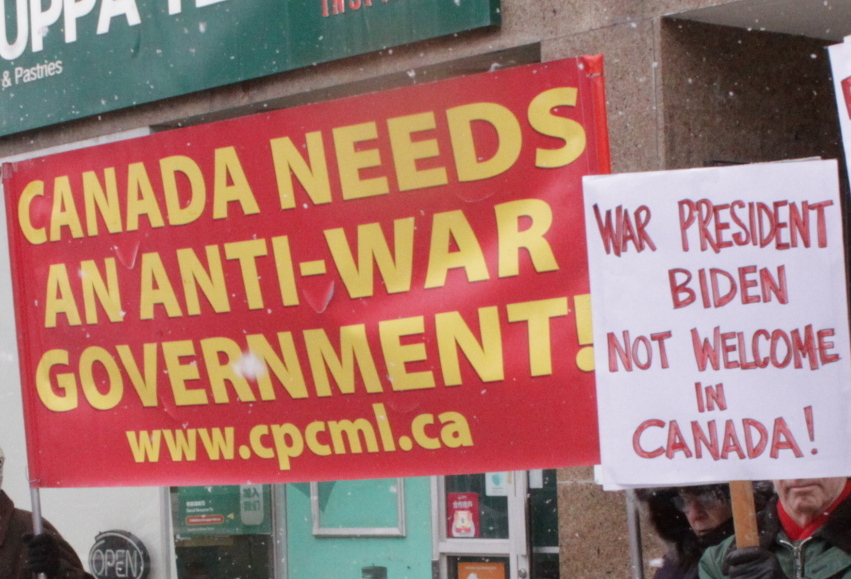
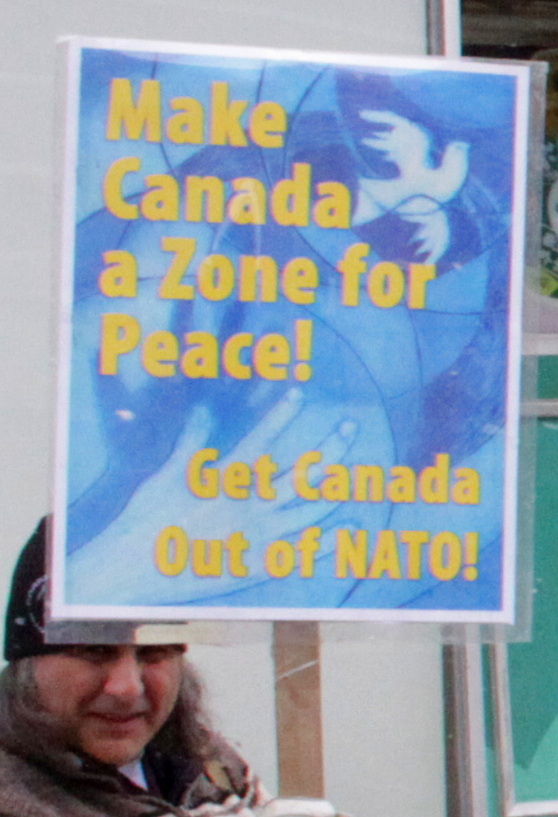 Toronto, March
19, 2023
Toronto, March
19, 2023

Windsor, March 19, 2023
(Photos: TML, YDR)
Canada's Follow-Through on
Commitments to
U.S. at North American
Leaders' Summit
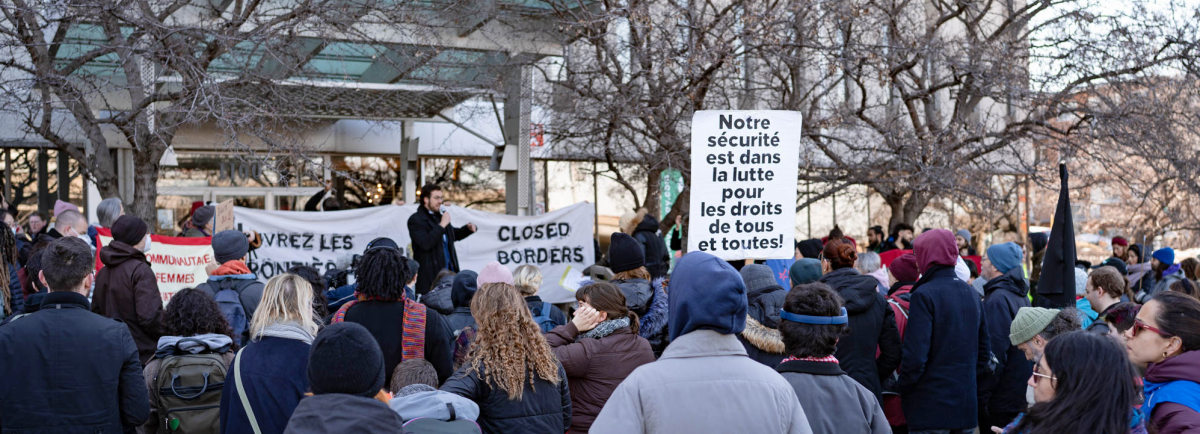
Rally
in Montreal, March 29, 2023, against closing of Roxham Road border
crossing due to expansion of Safe Third Country Agreement.
The visit to Canada of President Joe Biden can be seen as the U.S. following up on commitments Canada made at the 10th North American Leaders' Summit in Mexico City on January 10, in which Biden, Prime Minister Justin Trudeau and Mexican President Andrés Manuel López Obrador participated.
Also known as the Three Amigos Summits, these meetings were begun under the governments of U.S. President George W. Bush, Mexican President Vicente Fox and Canadian Prime Minister Paul Martin in 2005 shortly after the U.S. launched the war in Iraq. At that time, there was a major push to integrate the military and police apparatus of the three countries under U.S. homeland security in the name of security against terrorism.
This year's summit focused on four areas in which the U.S. expects Canada to step up its support for U.S. aims and escalate its integration into the U.S. economy and war machine:
1) supply chains for semiconductors for computer chips,
2)
critical minerals and resources which are strategic for military and
economic purposes,
3) migration of peoples, and
4)
talk about equity and anti-racism to make it appear that there is a
balance between what the rich want and what the people want.
Announcements made by Trudeau and Biden during the latter's visit to Canada followed through on the first three of these areas.
A statement issued by the Prime Minister's Office on March 24 stated:
"Working together with the U.S., we will advance a cross-border semiconductor manufacturing corridor, beginning with the signing of an arrangement between Canada and IBM to expand domestic research and development and advanced packaging of semiconductors. Semiconductors enable advances in clean energy, communication, computing, and more, and Canada has a vital role to play in the North American semiconductor ecosystem. Canada's investment of up to $250 million in this sector will also improve North American competitiveness and supply chain resiliency, help cut pollution, foster economic and national security, and create good middle-class jobs."
The issue of critical minerals is primarily aimed at establishing supply chains for these materials that are not connected to China, but is typically discussed in the name of "greening the economy" and other high ideals. Thus, "The leaders agreed to work together to promote trade in clean goods, including clean steel and aluminum, and continue to collaborate on renewable energy and electric vehicle supply chains, the critical minerals value chain, nuclear energy, and aligning zero-emission vehicle (ZEV) infrastructure to create new opportunities for people to thrive and have great careers."
Migration across the U.S. border into Canada, especially by those who cannot avail themselves of official channels to transit borders or seek refugee status, which the U.S. and Canada deem "irregular migration," was further restricted in the March 24 agreements. The two leaders stated, "To address irregular migration, we are expanding the Safe Third Country Agreement to apply not only at designated ports of entry, but across the entire land border, including internal waterways, ensuring fairness and more orderly migration between our two countries. This change will come into effect at 12:01 AM (EDT) on Saturday, March 25, 2023." The situation facing those making "irregular" border crossings is already potentially deadly, and this announcement will only make matters worse.
Regardless of the moniker the "Three Amigos," the Canadian government's servility to U.S. aims at the discussion in Mexico in January, and in the announcements made during Biden's visit to Canada have nothing to do with the fraternal relations of mutual benefit, friendship and peace that the peoples of Canada and Quebec seek with the United States or any other country.
(Photo: Solidarité sans frontière)
U.S. Operations in Canadian Arctic Consolidated During Biden's Visit
One aspect of the Trudeau government's agenda since being elected has been to slowly permit the U.S. to expand its operations in the Canadian Arctic, in the name of protecting Canada from imaginary threats from Russia and China. The main method has been to push an expanded role in the Arctic for NORAD, which is under U.S. command, as if it is a joint operation. This agenda was further advanced during U.S. President Joe Biden's visit to Canada.
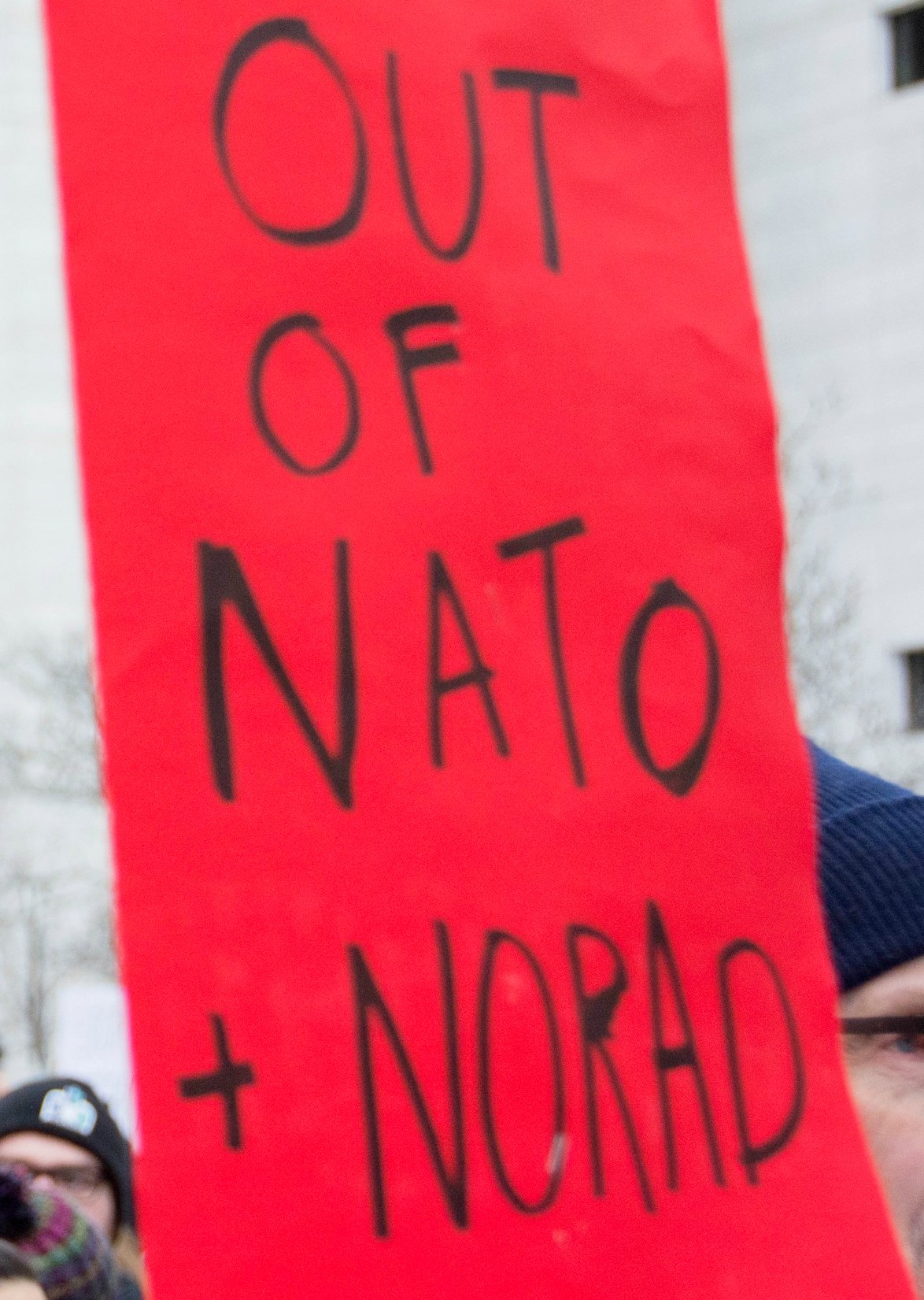 A
joint statement from Biden and Trudeau on March 24 stated, "Our highest
priority is to protect our citizens and our sovereign territory. We
will invest in the modernization of the North American Aerospace
Defense Command (NORAD), including specifically:
A
joint statement from Biden and Trudeau on March 24 stated, "Our highest
priority is to protect our citizens and our sovereign territory. We
will invest in the modernization of the North American Aerospace
Defense Command (NORAD), including specifically:
"As part of a CAD$6.96 billion investment in surveillance system modernization, procuring and fielding two next generation Over-the-Horizon Radar (OTHR) systems covering the Arctic and Polar approaches, the first by 2028 to enhance early warning and domain awareness of North American approaches;
"CAD$7.3 billion in investments in the northern forward operating locations to support fifth generation aircraft and mobility/refueling assets, which capabilities should be in place prior to the arrival of the F-35 aircraft, including airfield improvements to accommodate aircraft personnel, fuel, and munitions, to ensure NORAD's ability to deter and defend against emerging threats to our air and sea space and compete with China and Russia for years to come.
"The Prime Minister confirmed that the funding for these investments would come from Canada's planned investments in defence infrastructure. These Canadian and U.S. efforts will bolster NORAD's ability to detect threats earlier and more precisely and respond effectively. In the face of global threats, the Leaders acknowledged the importance of investment in modern, ready, and capable forces in line with their commitments to NATO under the 2014 Wales Summit Defence Investment Pledge. Such investments enable effective contributions to NATO, United Nations, and other global missions."
Since mid-2022, much has been said about Canada's commitment to modernize NORAD. In June 2022, Minister of National Defence Anita Anand announced this would involve the previously announced outlay of $4.9 billion for the first six years, with new funding coming into play in year seven amounting to $38.6 billion over 20 years, for a total expenditure of almost $49 billion on the project.
The modernization project is mainly about enhancing the surveillance capabilities of NORAD, which means the surveillance capabilities of the U.S. in the Arctic as a whole and the Canadian Arctic in particular. Much of it involves the use of new remote-controlled technologies, some still to be developed, involving networks of sensors, drones and other types of unmanned vehicles both on and under the water in the Canadian Arctic.
A recent report by CBC addressed the modernization of NORAD in the Canadian north and roadblocks it has come up against. The report quoted Vice-Admiral Bob Auchterlonie, in charge of Canadian Joint Operations Command, who spoke about Canada's work "in conjunction with" the U.S. Navy's Fifth Fleet for the development of undersea surveillance systems, including unmanned ships and underwater vehicles.
"I would say that technology has really moved forward in the last number of years. And we're working with our allies, as well as their own defence scientists, to come up with those capabilities to detect adversaries in our waters [...] both on the surface and subsurface," Auchterlonie said. The U.S. navy has plans for revitalizing its Fifth Fleet by 2045 which calls for a fleet of 373 manned ships and 150 unmanned patrol ships, for a total of 523 ships. The navy has asked the U.S. Congress for more than U.S.$250 million to develop unmanned surface and subsurface ships.
What this shows is that one way in which the Canadian Arctic will be handed over to U.S. control will be through the use of remote controlled and unmanned ships and drones as well as sensor arrays which communicate with each other and with NORAD.
In other words the new technologies being developed are to facilitate the U.S. taking control of the Canadian Arctic and militarizing it without putting obvious "boots on the ground." This is one reason why Prime Minister Trudeau keeps saying he stands for Canadian sovereignty over its Arctic and the Northwest Passage. He can say he doesn't want the U.S. in the Canadian Arctic while he opens it up to remote control by the U.S.
Urgent Need to Defend the Rights of Migrants and Refugees
Montreal Protest Against Canada-U.S. Decision to Further Block "Irregular Migration"

On March 29, a protest was held in Montreal outside the constituency office of Prime Minister Justin Trudeau, against the closure of the Roxham Road border crossing between Quebec and New York State. Besides Solidarity Across Borders, which organized the action, representatives from community and other organizations representing students concerned about the natural and social environment, women, those working in health care and others spoke.
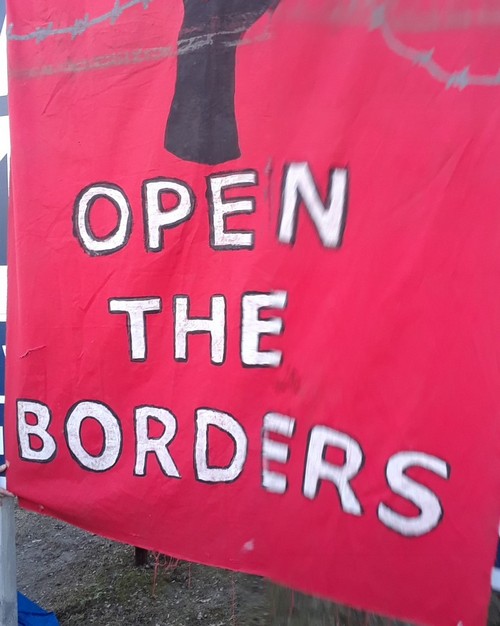 The
closure of Roxham Road is a direct outcome of U.S. President Joe
Biden's visit to Canada. On March 24, Canada and the U.S. "announced an
Additional Protocol that expands the Safe Third Country Agreement
[STCA] and applies across the entire land border, including internal
waterways." Under the STCA, Canada and the U.S. have declared each
other safe for refugees
and block those seeking asylum at the U.S.-Canada border from doing so.
The
closure of Roxham Road is a direct outcome of U.S. President Joe
Biden's visit to Canada. On March 24, Canada and the U.S. "announced an
Additional Protocol that expands the Safe Third Country Agreement
[STCA] and applies across the entire land border, including internal
waterways." Under the STCA, Canada and the U.S. have declared each
other safe for refugees
and block those seeking asylum at the U.S.-Canada border from doing so.
Although the deal had been prepared a year ago asylum seekers themselves were given only a few hours notice by the federal government before it closed the border when the extension of the STCA went into effect on midnight March 25.
Through the STCA, in place since 2004, Canada turns back refugees to the U.S. where they face arbitrary detention, expedited removal without having their cases heard, and criminal prosecution for crossing into the U.S. This is in violation of Canada's international commitments towards asylum seekers.
Participants in the March 29 rally called for an end to the STCA. They pointed to the cruelty and hypocrisy of the Trudeau Liberal government, with all its talk about preparing a massive regularization program for those without status, that had been working in secret with the U.S. for a year to close the irregular border crossing, adding that there could no longer be any illusions with regard to any assistance from the federal government with regard to those traveling through the Americas in search of security.
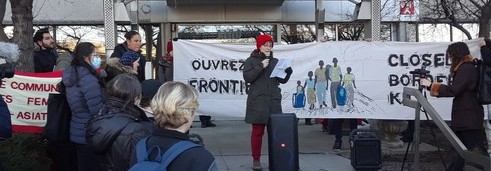
They also condemned the Coalition Avenir Québec (CAQ) government which at the beginning of the pandemic, spoke of those who had traveled through Roxham Road as essential workers and guardian angels and now, with all its rhetoric, treats those entering irregularly as a threat to Quebec's so-called national cohesion, etc.
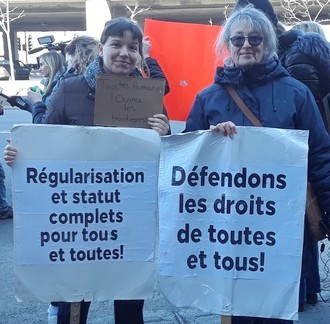 Asylum
seekers themselves, they said, including entire families with young
children, who had often traveled through numerous countries, facing all
manner of peril and trauma until they arrived at Roxham Road, where
federal installations had been set up that ensured their safety when
crossing,
were given merely a few hours notice before the border was shut tight
in their faces in the early morning of March 25.
Asylum
seekers themselves, they said, including entire families with young
children, who had often traveled through numerous countries, facing all
manner of peril and trauma until they arrived at Roxham Road, where
federal installations had been set up that ensured their safety when
crossing,
were given merely a few hours notice before the border was shut tight
in their faces in the early morning of March 25.
If caught, other than for a few exceptions such as unaccompanied children and those with family members living in Canada, asylum seekers must now prove they have been in Canada for 14 days, otherwise they will be returned to the U.S.
Those who spoke also pointed to the deaths of Fritznel Richard, a Haitian national who, for lack of a work permit, had tried re-entering the U.S. and Mexican national Jose Leos Cervantes, a Mexican national who had been struggling to make a living for his family in Toronto who died near the U.S. border.
Notably, the governments of the two countries claim in their announcement to broaden the STCA that they "share a strong interest in safe, fair and orderly migration, refugee protection, and border security. This includes a commitment to addressing the root causes of irregular migration and forced displacement, while respecting the rights of those fleeing persecution." Are the U.S. and Canada taking measures to end their foreign interventions, including war and aggression, that are the root cause of the displacement of millions of people worldwide? In fact, Biden's visit to Canada was an opportunity for the two countries to plan further infamies against Haiti and its people which will only exacerbate the crises they face.
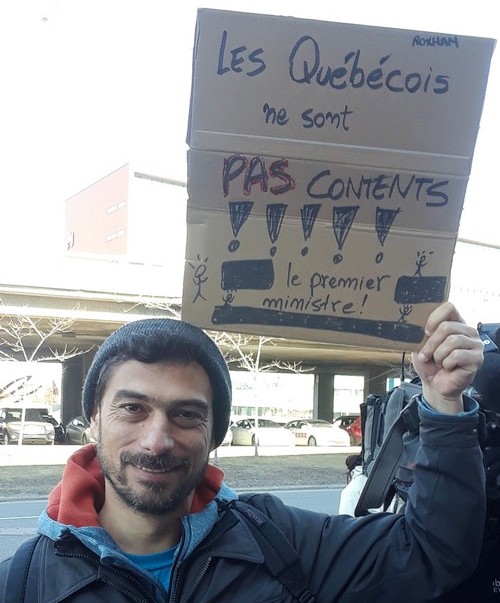 The
unity in action of all groups working in defence of the rights of all,
speakers said, must be strengthened and the entire working class called
upon to take up as theirs the struggle in defence of the rights of all,
as full-fledged human beings, with all the rights that this entails.
The
unity in action of all groups working in defence of the rights of all,
speakers said, must be strengthened and the entire working class called
upon to take up as theirs the struggle in defence of the rights of all,
as full-fledged human beings, with all the rights that this entails.
The urgent need to oppose the criminalization of migration and the need for safe means to migrate from one country to another is underscored by the death of at least eight people from two families on March 30, attempting to make an "irregular crosssing" from Canada to the U.S. across the St. Lawrence through Akwesasne Mohawk territory.
A petition campaign is underway to end the STCA.The petition can be read and signed here. TML calls on everyone to go all out through the petition and other means to bring an end to the STCA and all of Canada's violations of the rights of immigrants and refugees, that cause so much injustice and tragedy.
(Photo: TML, Solidarité sans frontière)
Canadian Union of Public Employees Condemns Roxham Road Border Closure
In a March 29 news release, the Canadian Union of Public Employees (CUPE) condemned the closure of the Roxham Road irregular border crossing, the main entry point into Canada used by asylum seekers traveling by foot from the U.S.
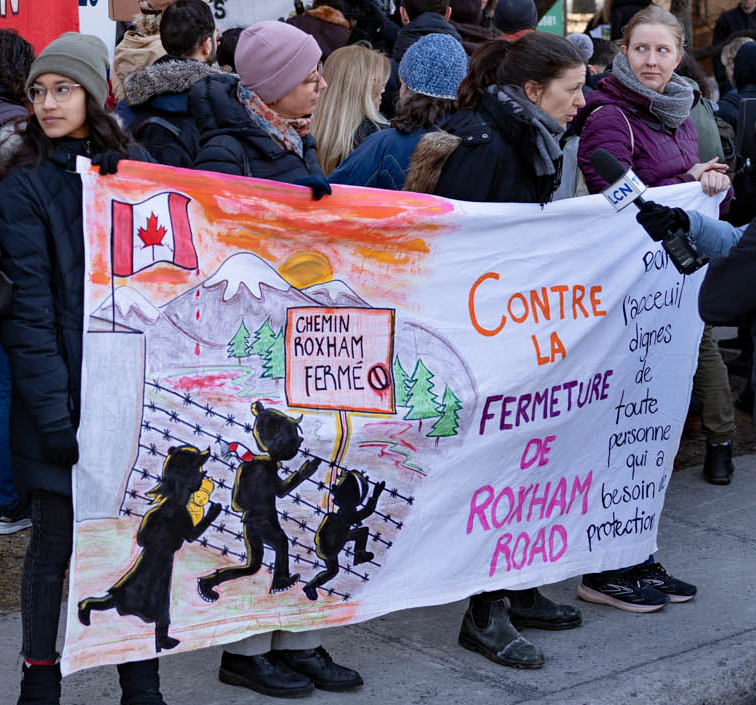 Closing
Roxham Road, it says, "will result in increased hardship, and possibly
death, for thousands of vulnerable refugees." Under the expanded Safe
Third Country Agreement [STCA], it explains, "refugee claimants must
request refuge in the first safe country they arrive in" and notes that
in that
accord, Canada designates the United States as a safe country. However,
it emphasizes, "Advocates point out that the U.S. does not in fact
guarantee the safety of refugees." It goes on to explain that "The
Canadian Council for Refugees highlights that refugees in the U.S.
system face arbitrary
detention, expedited removal before they have had a chance to appear
before a judge, and criminal prosecution for crossing into the U.S."
Closing
Roxham Road, it says, "will result in increased hardship, and possibly
death, for thousands of vulnerable refugees." Under the expanded Safe
Third Country Agreement [STCA], it explains, "refugee claimants must
request refuge in the first safe country they arrive in" and notes that
in that
accord, Canada designates the United States as a safe country. However,
it emphasizes, "Advocates point out that the U.S. does not in fact
guarantee the safety of refugees." It goes on to explain that "The
Canadian Council for Refugees highlights that refugees in the U.S.
system face arbitrary
detention, expedited removal before they have had a chance to appear
before a judge, and criminal prosecution for crossing into the U.S."
CUPE adds that "Advocates have long argued that the solution to unofficial border crossings is to suspend the STCA and let people cross in a safe and secure way at official ports of entry. Two separate courts have ruled the STCA is unconstitutional, in 2007 and 2020. The Supreme Court of Canada heard a case about the agreement in late 2022 and has not released its decision."
The union goes on to cite the Migrant Rights Network as saying that "refugees and other migrants were already dying crossing via Roxham Road because the Safe Third Country Agreement (STCA) and other immigration laws made it impossible to travel safely."
"Canada's undemocratic decision to close Roxham Road will push refugee claimants, many of them desperate to find safety, to cross in more unsafe ways," CUPE adds.
"People have lost limbs and died crossing in dangerous conditions at various locations along the U.S.-Canada border, because of the STCA. The Canadian government's latest decision will make such tragedies more common. It is also an unworkable and expensive plan that will fuel increased border surveillance and embolden the human smuggling industry.
"Canada is on the wrong side of history" the trade union writes. "Under international law, people have the right to seek refugee protection and to a fair process that determines whether they should receive it."
CUPE is calling on its 715,000 members to "take action by supporting the Migrant Rights Network's campaign to support refugee claimants seeking safety in Canada."
(Photo: Solidarité sans frontière)
Facts About "Irregular Migration" in Context
Canada deems those who cross the Canada-U.S. border without passing through official border crossings as irregular migrants. Certain forces cynically exploit the situation of immigrants and refugees for self-serving purposes.
Using the shopworn practice of divide and rule, it is claimed that unsustainable numbers of immigrants and refugees are creating social crises. There is no truth to this. It is disinformation to cover up the anti-social offensive that has been waged on the people for decades by the ruling circles, to undermine the people's struggles to unite their efforts to create new pro-social arrangements. Moreover, it fails to address the reasons why people are displaced from their homelands and migrate to other countries, because doing so would directly implicate Canada as a responsible party.
This is the background to demands from the Premier of Quebec and others to strengthen the Safe Third Country Agreement (STCA), which Canada and the U.S. have now agreed to do. Looking at the actual figures, demands to crack down on supposedly high numbers of so-called irregular migrants do not bear up to scrutiny.
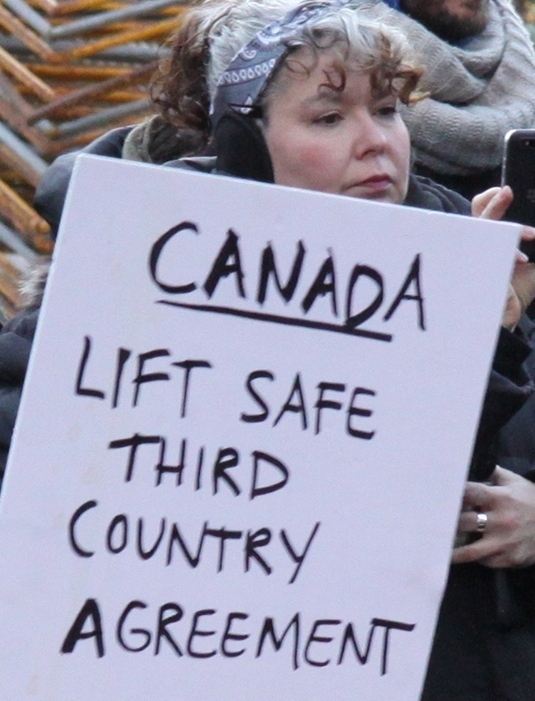
Not all of those making irregular crossings apply for asylum as refugees -- only 20,891 people who crossed into Canada by foot claimed asylum in 2022, out of a total of 60,158 claims. The STCA and its recent extension to apply across the entire land border and waterways between Canada and the U.S. would specifically turn back such people to the U.S.
One of the major reasons for people being displaced and forced to migrate are the U.S.-led coups, sanctions, aggression and wars. Canada, as an appeaser of U.S. imperialism and through its membership in the aggressive alliance NATO, is fully embroiled in such activities. A majority of Quebeckers and Canadians oppose this support for U.S. imperialism and consider that Canada should not be creating refugees in the first place and should let in those it has victimized and displaced, not as an act of charity but to take responsibility for its wrong-doing.
The number of those seeking refugee status needs to be looked at in the context of Canada's overall immigration numbers. The Migrant Rights Network notes that 616,429 Ukrainians have been approved for travel to Canada since 2022 and that in 2022 nearly 1.2 million new work and study permits were approved in Canada. The network further points out, "When asylum claimants arrive on foot from the U.S., they go through normal security screenings and the refugee claim process just like any other claimant. The acceptance rate for asylum seekers crossing on foot is 60 per cent, the same as all other claimants."
In other words, there is nothing exceptional about irregular crossings at Roxham Road or anywhere else, nor do these crossings and refugee claimants figure largely in the total numbers of those migrating to Canada. The facts and figures make clear that the STCA is unnecessary and the demand for its repeal is just.
Royal Canadian Mounted Police Out of Wet'suwet'en Land!
Oppose State Violence Against Wet'suwet'en in the Service of Private Interests
The Gidim'ten Checkpoint informs that on the morning of March 29, "a large force of the RCMP's Community Industry Response Group (C-IRG) raided a Gidimt'en village site and arrested five land and water defenders, mostly Indigenous women, including Gidimt'en Chief Woos' daughter. The raid accompanied a search warrant for theft under $5,000 with no clear relation to the Gidimt'en village site.
"This large-scale action by the RCMP's Community Industry Response Group (C-IRG) involved more than a dozen police vehicles and officers drawn from throughout British Columbia. The arrests come just weeks after the Civilian Review and Complaints Commission (CRCC) announced they have 'initiated a systemic investigation into the activities and operations of the RCMP "E" Division Community-Industry Response Group (C-IRG).'" Video of the raid can be viewed here.
TML denounces this latest raid against the Wet'suwet'en and the nefarious role of the Canadian state in its use of police violence to intimidate and criminalize the Wet'suwet'en for exercising their right to say No! to the pipeline that Coastal GasLink is forcing on them. Canada is duty-bound to respect the jurisdiction of the Wet'suwet'en on their own traditional territories, that have never been ceded. Canada's treatment of the Wet'suwet'en and the egregious state of affairs facing Indigenous Peoples that it oversees shows that its claims to be a champion of human rights and its admonishment of other countries to justify meddling in their affairs, is an utter sham.
The Wet'suwet'en explain, "In the days leading to this police action, RCMP C-IRG have been found patrolling Wet'suwet'en traplines and cultural use areas, harassing and intimidating Wet'suwet'en members and disrupting constitutionally protected Wet'suwet'en cultural activities. Members of a private security firm hired by Coastal GasLink pipeline, Forsythe, have also escalated harassment and surveillance efforts against Wet'suwet'en members in recent days.
"Both the RCMP's C-IRG unit and Forsythe are named as defendants in an ongoing lawsuit launched by Wet'suwet'en members, which alleges that police and private security have launched a coordinated campaign of harassment and intimidation in an effort to force Wet'suwet'en people to abandon their unceded territories."
Sleydo', spokesperson for Gidimt'en Checkpoint, said: "This harassment and intimidation is exactly the kind of violence designed to drive us from our homelands. The constant threat of violence and criminalization for merely existing on our own lands must have been what our ancestors felt when Indian agents and RCMP were burning us out of our homes as late as the '50s in our area. The colonial project continues at the hands of industry's private mercenaries -- C-IRG."
The Wet'suwet'en point out that the raid and arrests come days before Indigenous delegates, including Wet'suwet'en Hereditary Chiefs, are set to arrive at Royal Bank of Canada's Annual General Meeting on April 5 to oppose expansion of fossil fuel projects without consent on their territories.
Wet'suwet'en Hereditary Chief Na'Moks stated: "This is harassment, and exactly what Royal Bank of Canada is funding. Ahead of its shareholder meeting next week, RBC continues to fund corporate colonialism, and displace Indigenous peoples from our lands at gunpoint -- all for a fracked gas pipeline we cannot afford now or in the future. In the context of the theft of our ancestral land, alleging stolen saws and clothing is outrageous."
Update on Land Defenders Arrested in November 2021
Land defenders arrested in November 2021 are still defending themselves in court. The Gidim'ten Checkpoint informed on February 28 that "A dozen Wet'suwet'en land defenders and supporters have applied to the Supreme Court of British Columbia to have criminal contempt charges stayed in light of widespread Charter violations stemming from police misconduct.
 "Alleging
an 'abuse of process,' the court applications highlight the RCMP's
'disproportionate and excessive use of force' against peaceful land
defenders during a series of militarized police raids in November of
2021. In violation of the Canadian Charter of Rights and
Freedoms,
the
applications allege that arrestees were variously denied their right to
security of person, subjected to unreasonable search and seizure,
arbitrarily detained and imprisoned, and denied reasonable bail without
just cause.
"Alleging
an 'abuse of process,' the court applications highlight the RCMP's
'disproportionate and excessive use of force' against peaceful land
defenders during a series of militarized police raids in November of
2021. In violation of the Canadian Charter of Rights and
Freedoms,
the
applications allege that arrestees were variously denied their right to
security of person, subjected to unreasonable search and seizure,
arbitrarily detained and imprisoned, and denied reasonable bail without
just cause.
"'The RCMP/CIRG's enforcement tactics impaired the Applicant's individual Charter rights, but the police misconduct also displays a systemic disregard for Indigenous rights and sovereignty and the Charter more generally,' the court filings state.
"The applications are grounded in Wet'suwet'en law and sovereignty, situating the arrests within a larger context of Wet'suwet'en-Canadian relations. Each arrest took place on the unceded lands of the Wet'suwet'en Nation. Defendants acted under the lawful authority of the Wet'suwet'en Hereditary Chiefs to uphold decisions made collectively by the nation in its governance hall (bahlats) to protect unceded Wet'suwet'en lands and waters.
"'The Wet'suwet'en have asserted a right to live on and protect their territories for thousands of years, primarily through the feast hall governance system carried out communally by its clans and house groups,' the application states. 'The impacts of the manner of enforcement are not limited to the individuals arrested, but extend to the efforts at reconciliation between the Wet'suwet'en and the federal and provincial governments,' it continues.
"In a 2020 Memorandum of Understanding, the governments of Canada and British Columbia recognized the Wet'suwet'en hereditary system as 'a legitimate government with title' to 22,000 km2 of unceded land. Despite this, the RCMP have repeatedly undertaken large scale, violent invasions of Wet'suwet'en traditional territories and have established a sustained campaign of surveillance, intimidation, and harassment, which is currently the subject of a separate lawsuit by Wet'suwet'en members."
Statement by Union of BC Indian Chiefs
 The
Union of BC Indian Chiefs (UBCIC) is outraged to learn of another RCMP
raid on Gidimt'en Checkpoint and the arrest of five people by the
Community-Industry Response Group (C-IRG), under the guise of a search
warrant for theft under $5,000. It is currently unclear what relation
there is, if
any, between the Gidimt'en checkpoint and the search warrant issued by
the C-IRG before the arrests. These arrests continue the troubling
pattern of police intimidation of Indigenous people asserting their
rights to access their own territories and rejecting fossil fuel
extraction. UBCIC
unequivocally stands with those standing up for the title and rights of
the hereditary leadership of the Wet'suwet'en.
The
Union of BC Indian Chiefs (UBCIC) is outraged to learn of another RCMP
raid on Gidimt'en Checkpoint and the arrest of five people by the
Community-Industry Response Group (C-IRG), under the guise of a search
warrant for theft under $5,000. It is currently unclear what relation
there is, if
any, between the Gidimt'en checkpoint and the search warrant issued by
the C-IRG before the arrests. These arrests continue the troubling
pattern of police intimidation of Indigenous people asserting their
rights to access their own territories and rejecting fossil fuel
extraction. UBCIC
unequivocally stands with those standing up for the title and rights of
the hereditary leadership of the Wet'suwet'en.
Grand Chief Stewart Phillip, UBCIC President, stated, "The Gidimt'en checkpoint is a strategically located camp at 44.5 kilometre on the Morice River FSR. Under the governance of their hereditary chiefs, the Wet'suwet'en are standing in the way of the largest fracking project in Canadian history -- today's raid constitutes a federal response to Indigenous defence of their land against this fracking project.
The Coastal GasLink pipeline (CGL), owned by TC Energy (formerly TransCanada) aims to connect the fracking operations of Northeastern B.C. with a Liquefied Natural Gas (LNG) facility in the coastal town of Kitimat. The rights of Indigenous Peoples to live free of violence and intimidation in their own homelands must never be subjugated to the interests of fossil fuel companies. The videos shared online show more than a dozen armed C-IRG officers lining up to go in for the raid -- why on earth would that much force be necessary?"
"C-IRG is notorious for making violent arrests of Indigenous people from their territories, and this appears to be yet another example. Ironically, we are currently awaiting the results of a systemic review into C-IRG activities that was initiated by the Civilian Review and Complaints Commission for the RCMP earlier this month. We call for C-IRG to be suspended indefinitely and certainly for the duration of this review," said Chief Don Tom, UBCIC Vice-President.
"José Francisco Calí Tzay, the United Nations Special Rapporteur on the Rights of Indigenous Peoples, visited Canada just last month and met with Wet'suwet'en hereditary chiefs," said K'áwázit Marilyn Slett, UBCIC Secretary-Treasurer. "His preliminary report after the visit raised the exact concerns that we have raised again and again -- that the criminalization of Indigenous human rights defenders is rampant and must be stopped. Today's raid is in contravention of the UN Declaration on the Rights of Indigenous Peoples which both Canada and BC have passed legislation to implement, and is a gross display of the ongoing supremacy of the colonial military industrial complex."
(March 29, 2023)
Visit of United Nations Special Rapporteur on Rights of Indigenous Peoples
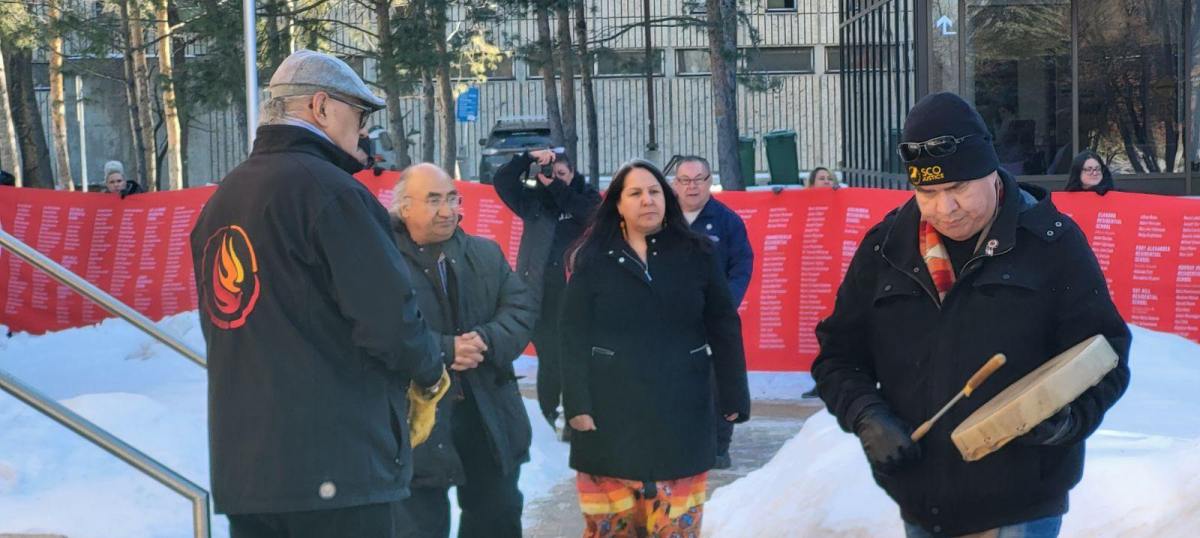
UN
Special Rapporteur José Francisco Calí-Tzay
(second from
left) visits the National Centre for Truth and Reconciliation in
Winnipeg, March 7, 2023.
José Francisco Calí-Tzay, the UN's Special Rapporteur on the Rights of Indigenous Peoples visited Canada from March 1 to 10, where he travelled to Ottawa, Montreal, Winnipeg, Edmonton and Vancouver, and met with government officials, Indigenous organizations -- including the Assembly of First Nations, Inuit Tapiriit Kanatami and the Métis National Council -- and visited Indigenous communities, as well as meeting with non-governmental organizations. During his visit, Calí Tzay examined a wide range of issues affecting First Nations, Inuit and Métis, including the implementation of the UN Declaration on the Rights of Indigenous Peoples and the right to self-determination, land and resources, as well as missing and murdered Indigenous women and girls, unmarked burials associated with residential schools, language and culture, and free, prior and informed consent.
Calí Tzay's UN profile explains that he "is Maya Kaqchikel from Guatemala, with experience in defending the rights of Indigenous Peoples, both in Guatemala and at the level of the United Nations and the [Organization of American States]." The UN Special Rapporteur on the Rights of Indigenous Peoples last visited Canada in October 2013, when the post was held by U.S. lawyer James Anaya, who at that time stated, "From all I have learned, I can only conclude that Canada faces a crisis when it comes to the situation of Indigenous Peoples of the country."
Calí Tzay issued an End of Mission Statement on March 10, which is excerpted below. He will present his final report to the Human Rights Council in September. It is clear from his statement that Canada's treatment of Indigenous Peoples continues to be a critical situation.
"In my capacity as the United Nations Special Rapporteur on the rights of Indigenous Peoples, I am pleased to share my preliminary observations and recommendations at the end of my official visit to Canada that took place from March 1-10, 2023. The purpose of my visit was to understand, in the spirit of mutual cooperation and constructive dialogue, how Canada implements the rights of Indigenous Peoples, in order to identify good practices and possible obstacles and to present concrete recommendations for overcoming the challenges I observed. My final assessment and recommendations to Canada will be presented in a written report to the Human Rights Council at its 54th Session later this year. Unfortunately, due to the limited time we have, my preliminary observations will not reflect the full range of issues brought to my attention, nor all the initiatives of federal and provincial governments related to the rights of Indigenous Peoples.
[...]
"The overrepresentation of Indigenous Peoples in the criminal justice system must be understood in the context of colonialism and the intergenerational trauma related to the residential schools. Disproportionately high rates of Indigenous Peoples in jails and prisons have been linked to structural racial discrimination at every level, including policing, the judicial system, and corrections. Indigenous women and gender-diverse peoples are the most impacted, representing about 50 per cent of females incarcerated in Canada even though they make up less than four per cent of the country's population. In the central provinces, including Saskatchewan and Manitoba, the numbers are as high as 85 per cent. Indigenous Peoples are disproportionately held in higher security settings and have limited access to culturally appropriate and responsive rehabilitative programming and are disproportionately subjected to the use of force and isolation. From what I observed, specific accommodations were not in place for gender-diverse prisoners.
[...]
"The relationship of Indigenous Peoples with their lands and territories has a central role in defining their identity as distinct peoples. I repeatedly heard, during the course of my visit, that true reconciliation can only be achieved by respecting existing treaties and providing restitution and compensation for the loss of lands, territories and resources. I welcome the 2017 decision of the Supreme Court of Canada, Tsilhqot'in Nation v British Columbia, the first declaration of Aboriginal title in Canadian history. However, I was informed that due to high costs and complex judicial and treaty negotiation processes, some Indigenous Peoples have to abandon their land claims. Also, I heard of how trust is broken when the federal and provincial governments continue exploiting lands and resources while modern treaties are in the process of being negotiated.
"During my visit, I was informed that a large number of megaprojects in Indigenous territories proceed without good faith consultation and in the absence of obtaining Indigenous Peoples' free, prior and informed consent, as in the case of Trans Mountain Pipeline. I am also concerned about the ongoing militarization of Indigenous lands and the criminalization of Indigenous human rights defenders resisting the Trans Mountain and Coastal GasLink pipelines in British Columbia. I urge the Government of Canada to end these violations and to adopt adequate measures to guarantee Indigenous Peoples' right to consultation and free, prior and informed consent, and their rights to lands, territories and resources.
[...]
"Indigenous Peoples are increasingly experiencing natural disasters and other emergency situations such as wildfires, flooding, deforestation, and extreme weather events, often due to or exacerbated by the activities of extractive industries. Climate change, including the threat of displacement from coastal erosion, has created new challenges for housing security. I call upon the Government of Canada to consult with Indigenous Peoples to address these challenges including support for Indigenous-led initiatives to conserve biodiversity and prevent environmental disasters and degradation. I reiterate the findings from my 2022 thematic report to the Human Rights Council that Indigenous women are active change agents in society and champions of sustainability, their scientific knowledge has a key role to play in safeguarding ecosystems and ensuring environmental justice and equity.
[...]
"I would like to end my statement by reiterating that Indigenous Peoples and individuals should be free from any kind of racial discrimination, in the exercise of their rights. Human rights are universal, indivisible and interdependent, and all Indigenous Peoples should have equal rights and opportunities. I urge the Government of Canada, the provinces and territories to use this momentum to advance reconciliation based on the nation-to-nation relationship with Indigenous Peoples. I would like to stress the reassurances conveyed by Canada that it is working towards a transformative future that respects and protects Indigenous Peoples rights to self-determination, lands, territories and resources."
For the full End of Mission statement, click here.
(To access articles individually click on the black headline.)
Website: www.cpcml.ca Email: editor@cpcml.ca

